#even though they fundamentally disagree on some key things
Text
EPic Rap Battles of Historeehhh
SURAK
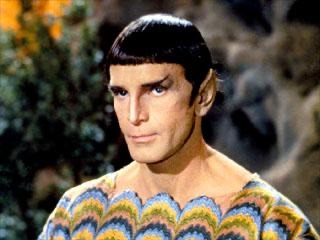
VERSus

KAHLEEEEEEEEESSSS!
BEGIN!
#first off no I’m not sorry#second off HOW HAS THIS NEVER BEEN MADE#they are both incredibly awesome Bagas wells of wisdom that fundamentally shaped their cultures for better and worse#they’re both Star Trek#Klingonese and Vulkansu are both developed conlang for the franchise#it would be AWESOME 🤩#is someone gonna help me write this or????#they’ve got fundamentally different belief systems but I don’t doubt they’d respect each other#even though they fundamentally disagree on some key things#it’d be like that western vs eastern philosophy rap battle they did it’d be SICK#star trek#surak#Vulcans#Vulcan#Kahless#Klingon#Klingons#epic rap battles of history#rap battle
95 notes
·
View notes
Note
I said this to others already, but to me this finale had a lot of 4x14 vibes tbh. Season 4 was severely hindered in it’s production due to COVID and i am, to this day, convinced that that’s also what made them tie it up with such a neat little bow before (at least in Bucktaylors case) undoing a lot of it immediately as season 5 rolled around. Essentially giving everyone the happiest ending they feasibly could.
And there’s something to be said about how mainstream tv seems to think that “happy ending” always equals “in a romantic relationship” whether or not the relationship itself is developed or healthy at all, but for two characters with character arcs so intertwined with their love life, it does make sense.
The thing is, to me this makes sense. Am I thrilled? No. But I’m excited to see what they do because I understand how this fits with the rest of the season and I’m not worried about it.
There were three big themes circling around Buck and Eddie all season. 1) missing the things that are right in front of you; 2) fantasy vs reality; and 3) Fear holding you back/preventing you from living your life. All three of these themes are tied together and need to be worked through to get to a place of Buddie canon and Buck’s “I’m already Christopher’s father” realization. But the last one is arguably the most important in order to get to the heart of the others and that’s where I feel like Marisol and Natalia come in.
Buck and Eddie both started the season single. But not because they necessarily wanted to be, because they were afraid not to be. Afraid to put themselves out there, afraid of being rejected, afraid of making mistakes. But being single out of fear is not the same thing as wanting to be alone or being comfortable with your life as it is, it’s just letting fear control your life. So the way I see it, if they had ended the season still single, that would have changed nothing from where they started.
For Eddie especially, this is a baby step but a necessary one. Whatever happens with Marisol, Eddie’s going to wind up on the other side with some confidence in himself and his ability to be a romantic partner and that’s what he needs to ultimately be secure enough to put himself on the line and really be honest with Buck. It’s low-stakes, it’s fluff, but I think it’s good for him.
For Buck, I disagree with the idea that he is inherently repeating the same mistakes. Yes, it’s not an auspicious start, but we as the audience see things that Buck doesn’t, and also there are some pretty key differences between Natalia and Taylor. With Taylor, they had a preexisting relationship. Buck knew going in all of the things about her that were dealbreakers for him, and instead of being true to himself, he told himself that he could “learn to live with it” and stayed with her for a year. With Taylor, he knew she was fundamentally a person whose values conflicted with his going all the way back to Dosed. He never should have dated her to begin with.
By contrast, he’s been on exactly three dates with Natalia. He barely knows her, and by all accounts she seems like a perfectly nice person even if someone who isn’t ultimately going to work for him (which is something that has been projected to the audience, but not for Buck). She hasn’t done anything wrong (it was pretty reasonable for her to feel overwhelmed and leave when Kameron crashed their date) and there’s nothing about her so far (in her personality or otherwise) that shows Buck is compromising himself and settling. Right now he’s clinging to a woman he wanted to date and get to know better anyway because she wants to be with him too and he’s feeling vulnerable—okay? He wanted to be with her though, I didn’t get the impression this was just about him being afraid to be alone (the way I felt about BT all through S4-S5). If they’re still together after the hiatus when they’ve known each other for more than five minutes and been on more than three dates, and we have actual evidence of him compromising himself where he shouldn’t? Then I’ll be agree that he’s repeating the same mistakes. But if anything right now I’m assuming this is his chance to prove his growth when he is ultimately put in a position to do better—that when something significant comes up he will be comfortable enough with himself to break things off instead of settling for what he doesn’t want. In the meantime, idk about y’all, but it takes me more than three dates to figure out if someone I’m interested in is going to be a good fit for me in the long run. And in a similar vein to Eddie needing to gain some confidence in his ability to be a romantic partner, I think Buck needs to be able to prove to himself that if he’s put in a situation where he’s settling, he’s capable of walking away. And for both of them I think those are important steps for them to take before they’re ready to be together.
174 notes
·
View notes
Text
Big Butch Talks Movies: The Creator 2023
Movie first watched (at the theater!) 9/29/23
“The Creator” 2023 directed by Gareth Edwards.
General likes -> worldbuilding, the sheer idea of it, symbolism, shot framing, soundtrack, language usage, acting, tropes used relative to “western” vs “eastern” politics, propaganda etc!, anti war message, set design
General dislikes -> women are very very relative to being mothers/wives instead of personal independence/agency*, possibly orientalist based on the location (though I am a white american and not the most educated on the topic and believe that some of it is plot relative which doesn’t make it ok, but gives a reason)
Personal thoughts -> absolutely blown away by the worldbuilding relative to the use of technology as shown by the Americans and the RoA/rebels. Acting was fantastic, especially young Alfie (or Alphie?) (Madeleine Yuna Voyles) and how her and Joshua’s (John David Washington) relationship evolved through the movie. The design of the robots, simulants, weapons and transportation was stunning, eye-catching and in my opinion, believable. The concept designers/those involved in design ideas should be cheered for!!!
Ramble -> I wish the character played by Gemma Chan was featured more prominently instead of being more of a simulant + Joshua saint/obsession. However this is a frequently occurring trope in thriller/action movies, woman who is obsessed over and ultimately, not what mc was lead to believe and tragically only important for what she represents rather than who she is and choices she makes. Interestingly enough there are three main women characters; the vengeful mother, hellbent on her delivery of fatal justice for revenge for the children she lost, wife and mother who is a non entity, chiefly a memory and a force used as a Reason To Endure, ultimately a peace maker, the child created as a peace-causing weapon, naïve but gains seemingly language, direction and purpose other than she was programmed with. She is the key to the rebel’s dream so it’s interesting they don’t really use her? That could be explained to be as a result of her tender age or the difference in ideology, if the Americans had a sentient, child weapon, no doubt they’d use her and not lose any sleep bc she’s not “real.” I loved the questions this movie asked: what does it mean to be human or “real”? ethics of robot usage once sentience is gained? how does one justify the use of such weapons? ethics of copying one’s likeness(-could be stretched to be work and other such personal matters)?
The juxtaposition of “eastern” (in this case I’m referring to Buddhism) and “western” (in this case i only mean Christianity) religion was very fun, the integration of the robots/simulants in the republic’s society was such that they were even represented in religious rituals and art/temples! On the other hand, from the Americans we as the viewer gets to observe, only the more shallow sense of Christianity is reflected, the belief (even in the weakest sense of the word) in heaven, sin (to be inferred from the belief that bc Joshua is not “good” and thus “not going to heaven” sin is relevant) forgiveness achieved through actions and absolution through sacrifice.
On IMDB the featured review says this movie is full of plot holes. I fundamentally disagree and believe that through bare bones imagination and analysis one can make plot based assumptions that are relevant to the story and general Vibe the director gives in other relevant works (Rogue One). The only “plot hole” is one that is Consistently used in space based/sci fi movies: the “my arm is stronger than the vacuum of space.” Thats literally the only real plot problem that stood out to me. Some articles are focusing on the AI thing and relating it to the current AI situation with its pollution of art and writing and it’s (in my, a random person’s opinion) such a dumb fucking stance. The problem I have with AI in the arts isn’t bc I hate robots. It’s bc I hate Actual People’s creations being bastardized and glued together in a ramshackle collage of bullshittery.
Detailed Synopsis (INCLUDES SPOILERS) -> the setting is a post-tragedy world where sentient robots and more human looking robots, simulants, have been used for years in harmony with humanity, suddenly a nuke goes off in downtown LA, killing millions and inspiring America (much like post 9/11 America) to launch a nationalistic war on robots/AI. Comparatively, the Republic of Asia is still comfortable with the usage and fully integrates these technologies into society, the home, culture and interpersonal/domestic relationships. This causes America to use the RoA as a scapegoat because the leaders/military believe “Nirmata”, the pseudo-mythical figure said to have ushered in the past/current era of AI-enabled robots/simulants is hiding in the RoA, caused (or at least did nothing to prevent) the attack and is developing a weapon that will end the “West.” This “fact” is used to create and launch attacks from a floating, in-orbit space station that launches bombs, called NOMAD* (*this is visually stunning, incredibly interesting conceptually and HORRIFIC to watch. So much collateral damage and civilian death.) which targets rebel bases and places Nirmata is thought to be hiding. 5 years ago, the main character, Joshua experienced a life altering event and is working a hard manual labor job (that gives the viewer great insight into the worldbuilding), and is contacted by the military saying “hey dude lol let’s go get Nirmata and destroy the weapon it’ll be totes chill and you’ll be a hero and don’t you want to be a hero? Plusbtwyourwifeisalivebro” and so he goes, chaos ensues bc these military ppl suck bananas at following orders, maintaining comms and not killing civilians for no fucking reason. Joshua finds the weapon only, fuck, it’s a simulant in the appearance of an adorable little child (never created before) and appears to know nothing of her purpose. Joshua grabs the kid, hightails it on out of there and goes on a wild goose chase trying to find his wife, in the process learning more about the young weapon, growing to care for her and being hunted by both the local police and the American military.
Ending Thoughts -> would I recommend this movie? Yes! Would I watch it again? Yes! Did it inspire my creativity and imagination? Yes! I found it incredibly entertaining, the action was beautiful, the locations were gorgeous, the devastation of the weaponry was heart-wrenching, the acting was overall quite good and I enjoyed the bittersweet ending and the message. I cried during the ending :)
45 notes
·
View notes
Note
Hi, I have two asks for you, if you don't mind?
1) which one do you think is the "fundamental" Loki interview, if there is one?
2) why do you think Loki's character is so popular? He started out as the villain and now he is a sort of hero, and he started being perceived "positively" before the show came about. It cannot be the looks (other avengers are good looking).
Thank you,
@merak-dubhe thank you for the asks, and I absolutely don't mind.
For the first question, are you referring to interviews done with about the character done by Tom and other creators or something else? Sorry I can't give a proper answer.
But question two! I have so many thoughts.
From a Doylist perspective, my friend Mary said something once that I think is very useful to consider. She said that when there is a villain that seems inherently likeable or becomes incredibly popular its because they intentionally cast an actor who is deeply likeable and friendly. That no matter how talented they are that is somehow stamped on their charisma and will come out in the character no matter what. I think Tom's Loki has this quality.
Also, his looks do matter because in most of the movies the villains are not attractive or are othered in some key way. Making a bad guy handsome is never not an important choice.
That said, it is not the only or even primary reason for his popularity.
I think he is popular and beloved because, despite a large part of the fandom thinking Marvel hates him, we are supposed to like him. Even love him.
Boy you are going to be sorry your asked.
Going back to the first Thor movie, when we are first introduced to Loki we see him as helpless, as an infant in a terrible place (I am going to refer to pure canon here, not fanon), which immediately forces the audience to see him as something the opposite of villainous, as a pure innocent. The next time we see him he is a child, and by comparison to his brother who we know is meant to be our 'hero' he is calm and thoughtful and frankly a lot less annoying. This continues through the follow up to Thor's temper tantrum after his failed coronation. Over and over we see Loki as calm, as thoughtful, as not a villain.
Having a character start coded as a hero, or at very least as decent and thoughtful, means that switching to seeing them as a villain is not only harder, but that view is always stained with the memory of who they were. And one thing that we have been trained to believe by films and books for centuries is that if someone was once good it is their destiny to become good again.
Additionally, Loki's turn towards being a villain is not a heel-turn. It is a process we get to see. His discovery of his secret origin (which is often an event in the making of a heroic character), his stymied confrontation with Odin which not only does not give him answers but clearly causes him to feel guilt, his being given the throne which we are told he does not want but also needs to feel validated. That Tom is a fantastic actor and we can SEE how Loki feels throughout the movie makes it all but impossible to hate him or even entirely disagree with him until his attack on Jotunheim. Which, when it fails and he chooses to fall rather than let Odin saves him, we can see as an attempt to kill part of himself, let us see exactly how broken and twisted he has become by what he has learned about himself.
We are never given the luxury of just seeing Loki as a pure villain which means for many people watching the movies he never will be.
(BTW, this is also why I think Marvel fans who did not watch the first Thor movie before seeing The Avengers or go back and watch it afterwards are less likely to see Loki in this light. Though not all of them, clearly).
In The Avengers Loki is at his most purely villainous. He is responsible for destruction and death, he is at the head of an invading, highly other army, he does that eye thing, he brainwashes people. He should be completely hateable. But he isn't. Well, for some fans he is but not all.
I am not going to discuss the 'sexy dom bad man' aspect of his popularity because that is all very obvious. He's gorgeous, he's dressed to kill all of the time, he's witty, strong, making people kneel, etc. We all understand that.
Rather, there are subtle moments, mostly acting based rather than script based, that play into our belief that, like Thor, we believe another Loki still in there. Small pauses, dull effect when giving orders, tears. A sense that Loki is playing the villain to convince himself as much as us. That when it is revealed he is being controlled as much as controlling it doesn't come as a massive twist. It feels like a given. Also, and I think this is significant, he is vulnerable. At the beginning he looks sick, confused even for a few moments, later he needs help getting into the truck, when Thor tosses him into the woods he holds his back and looks exhausted. We see Loki get hurt time and again which actually aligns him with the heroes at the end of the movie, who are all scuffed and tired and hurting - other than Thor who is at his most godly in this film, and the Hulk, though we know Banner is going to feel it later.
Cutting this character out of time to be the main character in the Loki series means at this point he considers himself a villain which makes the shit he goes through make sense to Loki if not to the audience (I don't want to get into this here, because that is another discussion).
By Dark World (and everyone knows T: DW Loki is my favorite), we get Loki in full anti-hero mode. Having him walk into the movie in shackles, guarded, brought before an authority figure makes him likeable to many viewers. He is sassy, unbowed, and the only time we see him break character is when he is threatened with eternal imprisonment.
The movie is about him, not Thor. We open with him, and other than the post credit scene, we close with him. It is about Loki and in the US we don't make big budget movies about the bad guys.
Loki is given the best lines, the funniest moments, the best reveals, the most heroic death. I think there is no question we are meant to love him. And when he shows up at the end, sitting on that throne, considering the state we last saw Odin in, I cannot help but believe we are meant to love him at that moment. He is now purely the Trickster, not the villain.
I don't have as many thoughts on Ragnarok, because while I enjoyed it, the movie doesn't lend itself to much thought. It is all there on the page, and it defies you to find a deeper thought in its pretty head.
I am sure you are now deeply regretting this Ask. Sorry for going on and on. I have given a lot of thought (obsessive thought) to this and I am actually cutting myself off. I could go into how the costuming and styling of the character, even the choice of using pine green for his costume instead of the poisonous or kelly greens often used in the comics are part of hero coding instead of villain coding.
But I won't. I should spare you something.
Thank you again!
77 notes
·
View notes
Note
i remember people saying that the duke and i and the viscount who loved me were very simmilar books when season 2 was coming out but having since read the them i have to disagree. i think the similarities they do share are just common genre tropes (and low-key julia's lack of creativity) but thinking they're the same book is silly to me. it doesn't help that they're back to back in the series i guess but idk that feels like someone who doesn't read a lot of historical romance would think.
Yeah, I've seen those comments, and like... Again, I hate to sound like a snob, but that's another "tell me you've only read the Bton books without telling me" flag. Marriage of convenience/marriage after being compromised is a CLASSIC historical romance standard. Certainly, it's not the only one. But it is VERY fundamental to the subgenre, and you can have a million differentiations of it that sound similar in theory but are incredibly different in execution.
All genres traffic in tropes, but I find that because of some perspectives on romance that aren't at all fair, romance gets dinged for more openly using tropes. The trope marketing has gotten old (though right now it works and I get why authors do it) but romance is no trope-ier than like... fantasy, tbh. Acting like a marriage after compromise thing is the same as any other marriage after compromise is like acting as if all chosen one arcs are the same. Harry Potter and Star Wars both have chosen one arcs with dead parents and older mentors who keep secrets and ultimately end up dying, PLUS prominent villain redemption arcs and backstories heavy on personally conflicted battles fought by the previous generation and parallels to real world fascist regimes and political conflicts, but I don't think anyone would say that if you've seen Star Wars, you've read Harry Potter.
The Duke and I and The Viscount Who Loved Me have very different heroines (Daphne is a girl next door who wants to be seen as more, Kate is a spitfire who doesn't outwardly care to get married), very different heroes (Simon falls into the icy duke category, Anthony is a Rake Classic if not a very scandalous or frankly rakish one), they do both involve compromising to marriage, but Simon and Daphne are not NEARLY as combative as Kate and Anthony, and additionally Simon and Daphne actually do get up to stuff and thangs, whereas Kate and Anthony don't go nearly as far before they're caught. Like, they kiss before then, but he's not actually trying to fuck her when they're caught lol. I think the marriage is much more jarring for her.
Also, Simon and Daphne have a huge issue between them re: kids, but it's not like Anthony and Kate wherein Anthony is outwardly, intentionally determined to not fall in love with whoever he is married to. So. Fundamentally different post-marital conflicts, imo, even beyond the basics of "Simon won't come inside her". (Anthony has zero damage with coming inside Kate, lol.)
Personally, I think that a lot of people just stubbornly refuse to read anything more than Julia's books, and even then a lot of them *say* they're reading the books and actually only read highlights about their faves lol. Which is fine. But admit it.
#romance novel blogging#ever since daisy jones and the six i've been increasingly considered that like 10% of the people who say they read these books#are actually reading them
7 notes
·
View notes
Note
I know that the relationships are complex in Stormbreak however would you say that Aemond is developing Stockholm syndrome? I saw this mentioned in a comment and couldn't stop thinking about it.
ooh i've been waiting for an ask like this one so i can explain in more detail what i think aemond's relationship with daemon and rhaenyra is like right now in terms of power dynamics & overall healthiness.
to answer your specific question: no, i don't think he quite has stockholm syndrome. he has developed postivive feelings for his captors, but a key part of stockholm syndrome is that the feelings have no rational basis. they're simply a coping mechanism to try to increase your chances of survival and are honestly independent of the captors. neutral interactions are seen as positive, and positive interactions are seen as much more positive than they actually are. the excuses for why the victim is now sympathetic towards the captor are far-fetched ("i thought he had sad eyes and didn't want to do this") or completely nonexistent.
a big part of why aemond is now more open to his relationships is because most of his prejudices against the blacks have been corrected. this is a psychologically sound reason for his change of heart. the clearest example of this is with rhaenyra. he thought she wanted to kill him and his family, and it's at least 90% of why he feared her; it's not irrational that his feelings towards her became more positive once he found out this wasn't true.
oh also, two quick disclaimers:
1. some parts of this will always seem squidgy to modern readers because of the nature of arranged marriages. aemond married rhaenyra for political reasons, not because he liked her personality; but this would have always been the case for him no matter who he married.
2. rhaenyra is always going to be the sole monarch, and is always going to have more power than aemond as a result. but she's going to have this over everyone. think of queen elizabeth and prince phillip's relationship as portrayed in the crown; there are situations where she will probably have to use this power to set her foot down, even if she doesn't personally want to.
these two things are never going away, even in a best-case scenario, and even at the end of this work.
okay now that i've said all that, let me make it clear that this by no means indicates that the current situation is healthy or that aemond's ability to consent isn't compromised. we are not yet at the best-case scenario, but we'll get there! right now aemond isn't on equal footing with rhaenyra or daemon, but also within dragonstone as a larger whole. he has basically re-named his knights from jailors to protectors, but they're very much still there. like, even if he wanted to go on a walk on a whim, he wouldn't have the freedom to do so unless the guards chose to let him.
aemond hasn't even asked to see vhagar. you can bet that if he was truly himself, he would have already gone and seen her without even asking permission. but he hasn't done that, and he hasn't even bothered asking, because he's convinced that the answer will be no. he's convinced that, on some level, he's still a prisoner. so how does this prisoner mentality affect him? a fundamental part of being a prisoner is that your captors have the capacity to punish you, and you do not have the capacity to fight or flee. so you live in fear of punishment, and that creates a hesitance to say no, or even to disagree with your captor.
in this most recent chapter, aemond only offered his opinion when he was specifically asked. this is in part because he is afraid of voicing an opinion that rhaenyra might disagree with, so it's safer not to say anything at all. when he did speak, he was visibly nervous or uncomfortable, again because of that fear. and when rhaenyra went against his wishes in appointing his personal guard, even though he knew she didn't mean to, he was still too scared to speak up because he did not know if she would deny him and become angry. now, if rhaenyra knew this she would of course tell him not to worry and to follow his own desires; but she doesn't realize. neither does daemon.
so, in conclusion: big progress has been made with the dismantling of prejudices, but there needs to be more progress with the equating of power dynamics before we can get to the best-case scenario with these three.
#what one thing does aemond need in order to consent to rhaenyra?#if you guess i'll write you a stormbreak drabble of your choice#anyways#whew this was a big boy i should be answering comments instead but here i am :)))#ask#asks#answered#hotd#house of the dragon#fic#fic: stormbreak#fic: stormbreak: spoiler free#stormbreak#aemond#aemond targaryen#daemon#daemon targaryen#rhaenyra#rhaenyra targaryen#daemond#daemyra#rhaemond#vhagar#aemyra
48 notes
·
View notes
Text
Quick Undertale ramblings on the alarm clock and religion portrayal
Howdy and Hola, friends. So a while ago on my Asriel character arc post, doloresbernathypiplup and admiral2019 were asking about whether or not I was following the winter alarm clock dialogue and how Asriel's conversion to Christianity works in Wholehearted when it seems like the Foxverse cast has their own religious system. While I did answer those questions in the comment section, I wanted to describe my answers more eloquently in one post so that no communication gaffs happen. I'm also afraid that I came off too dismissive or blunt without intending to, so I wanna give more detail as to my opinions on both, since both dolores and admiral have understandably decent questions.
...
First, the alarm clock dialogue. I DON'T consider it canon. This is probably an unpopular opinion on tumblr, but I don't take it as canon. The reasons why I don't are, 1.) the project got canceled and never fully released. If the project were finished, then there's a possibility things would be different. But, even though dialogue got released, the clock never got finished like Undertale itself did. 2.) Toby has said before that merch isn't canon, but if the clock were released in full in an alternate timeline, then it would perhaps stretch into the "merchandise" category. In that scenario, a fully released clock being canon would be contradictory since it then becomes merch in the manner of a downloadable app. And 3.) the Undertale wiki has described the clock as "dubiously canon," which puts a question mark on canon reliability for the clock as well.
It's cool if others treat the clock as canon; I'm fine with that. But my own wish and hope are that anyone who stumbles across my story will understand *why* I don't personally consider it canon and thus don't follow it as a reference point in my works (and for understandable reasons) and are willing to agree to disagree with me. As long as people can roll with that and not try to discredit my work simply because I don't agree with the clock and are cool with agreeing to disagree instead, we're all good here.
...
Now, portraying Asriel as a believer in my works. I know people have discussed before that the monsters seem to have a religion based around the "Angel" and thus, why would Asriel convert to Christianity in the Wholehearted series, especially considering the "Angel religion" as we'll call it? I'll also explain more about that here.
Undertale and Deltarune are confirmed to be on two separate timelines. This point of reference is *really* important, because just because some lore is portrayed one way in Deltarune doesn't mean a writer has to *follow* said lore in an Undertale-based story, and vice versa. This is due to them being on different timelines, and thus part of why I can write Asriel as a Christian in an Undertale based story without worrying about Deltarune. Let's get into that now.
In Deltarune, we have a fully-fledged religion based around the Angel. Lighteners worship the Angel as their god, and there's a full church system based around him. Not only that, but characters like Asriel, Toriel, Monster Kid, and Reverend Alvin faithfully worship the Angel in said game, with Asriel even being a church choir boy and a religious ska enjoyer. How does this differ in Undertale? Well, we hear of an Angel prophecy where the Angel, who has seen the surface, will free the monsters one day (which is revealed to be Asriel/Flowey). However, there are many *key* differences here. In Undertale, while the prophecy speaks very positively about the Angel, we never see any church system, nor religious ska, nor choir, nor worship system build on the Angel at all. Asriel/Flowey/the Angel is treated more like a mysterious folk hero. But in Deltarune, on the other hand, the Angel is worshipped, revered, sung about, and has a full church system built upon him. We also don't know if Asriel/Flowey is the Angel yet in that game or not. Due to those fundamental differences between games, we can safely conclude that while the Angel religion is indeed a thing in Deltarune, it's *not* necessarily a religion in Undertale and is more left up to interpretation due to being far more vague and less evidence for existing as a full-scale religion in Undertale.
As for me writing Asriel as a Christian in Wholehearted, it's for many reasons. 1.) When I learned that he loved religious ska and was a faithful choir boy in Deltarune, I just translated those elements over to my Undertale post-pacifist work as a neat little easter egg thing. 2.) I'm a believer myself, and I wanted to insert a little personal part of myself into Asriel's character to give me more motivation to write. 3.) The motive for him becoming a Christian is to be free from his past and finally feel clean, wanting to be permanently forgiven for all he's done. This is explained in Wholehearted Half-Souls chapter 2, where the narrator explains that he now wears "a wooden cross necklace also dangles around Asriel's neck, reaching down to the upper part of his chest. Being a religious child of faith, he is now renewed *with hope of finally being free, and being permanently forgiven for his past.*" He also says in a later chapter (WHHS, chapter 13) that he was never a real God, and he was very arrogant in that claim, helping develop his growth in humility.
For those reasons, Asriel being a Christian is understandable for multiple reasons and both from a "Deltarune translation over to Undertale" easter egg perspective (with some tweaks) and a character arc perspective. I'll be focusing on his conversion more, however, in Wholehearted Origins, with "First Day" releasing during the next few weeks. That story takes much time to focus on how he's seeking permanent forgiveness and wants to come to terms with his past. That's the origin of how he becomes a believer in my work. And hey, considering all the guilt he's built up, it makes sense as to why he would do such. As long as that motive is there, it helps me avoid being too preachy or on the nose in my stories.
...
I'm sorry if I was too blunt or dismissive in the comments. That was not my intention, and I want to give a more fully-fledged answer now so that everyone knows I'm not mad or angry with anyone. I just have thought a lot about this and feel passionate about it. In any event, thanks to both delores and admiral for their questions and interest.
I'll leave it here for now. Take care, friends. I'll see you guys this weekend for the official release of chapter 2 of "First Day" on AO3 and Wattpad.
#undertale#undertale au#canon compliant#post canon#wholehearted origins#wholehearted saga#wholehearted half-souls#whhs#asriel whhs#flowey whhs#undertale alarm clock#undertale pacifist#ramblings#Christian references#deltarune
6 notes
·
View notes
Note
Someone being found by a court as not being able to be charged with a violation because there isn’t enough evidence to legally prove it beyond a reasonable doubt is NOT the same as someone being found to have for sure not committed the violation. Also all those pedo/“jailbait” and racist texts he sent are still real.
(Cont) So: He may well have done it and I didn’t see any proof-positive evidence presented that his accuser lied at all.
For comparison this would be like if I keyed your car and you saw me do it, but there’s 0 evidence I did besides your word and I’m convincing in denying it to a court so I get off free. Does that make you a liar for sure? Does that mean I didn’t do it for sure? Or does it just mean I can’t be convicted of it.
---
I'll be super honest, I'm assuming I've heard and possibly even posted before about his behavior on Twitter, probably because I agreed with the sentiment someone else said (or maybe I said it?) that it doesn't surprise me that the person who wrote Rick and Morty would do that, not because it's a given that someone who writes that way is a creep, but because as far as I managed to watch I kind of picked up on something underneath it all that could have just been my imagination or it might not have been. But I pay so little attention to content creators that I can't even remember the guy's name unless I look it up and I forgot all about that he had been saying a bunch of gross stuff, too.
But like, when curiosity gets the better of me, after seeing a post on here talking about how so-and-so is being a dick on social media or some other such thing that's just vague enough that if you know you know and if you don't it won't mean much to just read it, I'll look up the name for a Wikipedia page and jump to the controversy section just to see what's up. His whole thing with the charges probably stuck with me since it's not all that often that accusations against people like him make it to court.
But as to your actual point, you're right, and I think I assumed when that ask was saying that he was declared innocent that that meant his accuser rescinded the accusation, or admitted that she had made it up, or something along those lines, but I work...maybe not necessarily in the legal field, but adjacent to it, so in my mind if someone is declared innocent that's above and beyond the case being thrown out due to insufficient evidence (I'm just assuming that's what happened, based on the content of your ask). Obviously every defendant is innocent until adjudicated guilty within the scope of the trial, but people have to make their own judgments out in the world.
As a whole I don't have any faith in the legal system. Juries will be biased no matter what the judge tells them before they're sent out for deliberations. The state will hide behind the concept of probable cause to bypass illegal search and seizure. Defendants get any and all prior criminal history marched out if they try to speak on their own behalf, in spite of the fact that nobody is supposed to assume guilt due to prior behavior. Every person in the courtroom knows good and well that they're operating under a fundamentally flawed system that really only gets worse with every reform brought forth to try and improve it.
One thing I must disagree with, though, is that because he creeped on that lady on Twitter that it serves as an indication that there's a higher likelihood he did the assault/kidnapping thing. One of the only things that the justice system gets right is the narrow scope of proceedings, because prior behavior doesn't necessarily mean that what someone is on trial before is more likely to be true.
Personally though, I think that if more people were killed trying to commit these sorts of crimes before they ever got a trial, there wouldn't be nearly as many. Unfortunately you have to be afraid of the state coming down on you for defending yourself half the time anymore.
0 notes
Note
I find Izzy and Blackbeard's relationship interesting because even though Izzy sees him as superior and puts him on a pedestal, I feel like he's the one with more power over the other. Idk I'd just like to know what your opinion is on that, I'm not really one for massively analysing shows
I'd disagree with this because fundamentally, Edward is the one in control. He's the one who gives Izzy his orders. He's the one who makes the decisions, as stupid or half-mad or bizarre as they may seem.
To me, Edward doesn't want to be a captain. He likes doing the exciting and interesting parts of it but he never really liked the work of it, being in charge of people, the practicalities. He brought Izzy in to be his executive function, to shout at people and give the orders. This is especially significant when he's introduced in the show when he admits he feels "trapped, treading water, waiting to drown". He's stuck in a rut and even Izzy has noticed his "increasingly erratic moods" and called him "half-mad".
Episode 4 perfectly captures this: Izzy spends the whole time chasing after Edward trying to get him to "come up with a plan" as if Edward isn't fully aware that the Spanish are likely to come after them and as if he doesn't already have a contingency plan in place. The fact that Edward does have a plan and doesn't bother to tell him, even though it was would stop Izzy from hissing and spitting and stamping speaks measures for how frustrated Edward is with making plan after plan after plan and that's it. "Is this all there is, man?" he demands. "It's all so fucking boring!"
The places where Izzy does look like he's in charge are in episodes 6 and episodes 10.
In 6, you'll notice he doesn't bring up the issues of killing Stede himself. He makes sure that he's got back-up in the form of Ed's crew. He's making it look like it's not a personal beef with Stede (which it 100% is) but is a crew related issue. It's a reminder to Ed that he has obligations and a position to uphold and he's not someone who can just run around and have a nice time. This is their life and their business and pirate crews were democratic about leaders who weren't leading.
When Izzy challenges Stede to a duel later in the episodes, when Ed says 'we're not doing this', Izzy says 'no, you're not doing this, so I must', reminding him of that decision made with his crew and his obligation. Stede accepting the duel takes the decision out of Ed's hands as well - he can hardly tell the captain of this ship he's not allowed to duel, can he?
There's also a key factor here as well: Ed is in a very vulnerable mental state in this moment. He's just had a panic-attack about his traumatic childhood memories, where a violent figure of his past attacked the kinder gentler person. And now this is playing out again in real-time in front of him. Watch his body language throughout the duel: he retreats over to the side of the ship, clings to the rope, hides his face.
The only other time Izzy really seems to take charge is in episode 10 in the cabin, but up until that moment, grieving sad Ed is still absolutely in control. He's curled up in his blanket fort, he's eating marmalade, and Izzy is awkwardly and uncomfortably telling everyone "he's fine. he's resting everything is all right get back to work".
The change comes when Ed comes out of the cabin, soft and sad, singing and wearing nice things and announcing they're not going to be pirates anymore. This is where Izzy loses his rag, because his entire sense of self and worth is tied up in being Blackbeard's first mate. Not Ed. Not some soft and singing lad. He absolutely loses his temper with Edward, yelling at him that he's meant to be the monster that everyone is so afraid of.
But the thing is he's not in control here, not at all. What happens is that he's simply the last straw in a successive pile of equally heavy straws. Ed, who has struggled with his identity and self-worth his entire life, has been trying to piece himself back together and it was going okay.
With Lucius's help, he was almost convinced he could be enough as himself, just being Edward for a bit, and then Izzy reminds him of how Stede saw him when they first met, shoved one of those illustrations of the Devil Pyrate Blackbeard in his face, brought back all those lifelong fears and all that belief that he was never and will never be good enough. Because if he was good enough, why did Stede abandon him like he was nothing? If he was worth anything, why was he abandoned?
That's why the 'pining for your boyfriend' line is the one to get such a violent response from Ed. Izzy insulting him and wishing him dead didn't get the anger. But the reminder that he's wrapping himself in nice things left behind by the man who decided he wasn't good enough? Ed lashes out because he's hurt and sad and when Izzy says "there he is", it hammers the final nail in the coffin.
It convinces Ed that this is what he's been all the time. "This is who I am," he told Stede. "Do you see me now?" because how can he be anything else?
And as much as Izzy is the catalyst for shattering him back into Blackbeard, in reality it's nothing to do with Izzy having any control of the situation. He was just poking buttons to get a response and just happened to hit the right one for a change. It isn't about him having control. It's absolutely everything to do with Edward's own trauma, grief and shame.
83 notes
·
View notes
Note
Hi!
First, I wanted to tell you that you're doing God's work.
Also, I know this is a longgg question, but how would you describe Ollie and Bruce's relationship? I'd love any canon proof you can provide too!
Thank you!
No panels because my brain isn't working with me today and for some of these examples I can't remember what comic they're from so I'm gonna tag in @batphobique (who tends to usually have the missing piece of my brain puzzle <3), and sorry for how long this has taken- but the short answer is it's complicated.
The long answer is that Bruce thinks they're friends and likes Ollie and even admires him, and Ollie.... doesn't feel the same.
Some of the key moments that really stick out to me in terms of highlighting Bruce and Ollie's relationship are things that really highlight their differences-
I like to use this panel from the GA 80th to sort of sum it up

But to go into more detail, despite being on the "same side" they're often at odds. Ollie criticizes Bruce's parenting loudly and consistently- Ollie does target practice at pictures of Bruce, they disagree on like fundamental questions about justice, their worldviews aren't really compatible. Ollie just doesn't really like him all that much.
Even going back to Silver Age Comics we see Ollie and Bruce operating on different sides of Justice League matters, Ollie and Bruce have completely different philosophies on training sidekicks (including Ollie's later rejection of sidekicks that Mia forces his hand on ignoring for her sake), Bruce works with the police- Ollie thinks they're fascists, Bruce is pro-watchtower and Ollie tries to shoot it out of the sky with his bow. Ollie's growth and learning in regard to addiction versus the myriad of comics in which Bruce says and acts on a belief of hating "junkies." They also have like very different ways of interacting with their "villains" when Ollie's villain isn't capitalism or society. Ollie's rejection of a secret identity is also sort of exemplary of the kinds of fundamental differences between them and their worldviews that can't really be pointed to with like individual specific comics. Ollie and Bruce also handle their wealth in very different ways, and the way Bruce does it is more akin to Ollie pre-island, which Ollie is shall we say, not fond of since returning from that particular venture.
But like going into interactions with them- Bruce hits below the belt with Ollie to avoid criticism of himself (from GA 2001), when Ollie comes back to life he knocks him unconscious and admits he would have cut him open if it wouldn't have killed him and then forces Ollie to watch footage of himself killing Hal (GA: Quiver)- like... Bruce doesn't really give Ollie a lot to like in newer comics, beyond like their fundamental differences as people with opposing worldviews who happen to be working for the same team.
Conversely though the reason given for why Bruce doesn't have a plan to take Ollie down like he does with the other leaguers is that he considers Ollie the least corruptible of them and has a harder time believing that Ollie would turn his back on the league, and for all his general disrespect of people who aren't him, Bruce is shown to respect Ollie more than he respects some of the other league members.
But generally speaking they aren't close, they are coworkers at best and even if Bruce considers Ollie a friend he isn't like necessarily fond of him and Ollie absolutely gets on his nerves a lot. That's something Ollie's very good at doing, is annoying people. He's a hot head and a firebrand that's what he does. And Ollie- he doesn't like Bruce, he thinks that Bruce needs monitored, and has said that Bruce by himself is a bad thing while trying to turn Bruce's son against him.
So yeah, their relationship is complicated, but like it's only complicated for Bruce.
83 notes
·
View notes
Text
So there’s a story in the 1999 Titans run where Dick and Kory argue after Kory kills a woman who was comatose, near death, and being ‘harvested’ of her blood for usage in some immortality ritual by Vandal Savage. Big yikes on that particular supervillain plot, but point is, that story is pointed to a lot to show that Dick and Kory have very different values and this is part of why they don’t work ultimately. With Dick judging Kory for having killed her even though Kory did it to end her suffering and because she couldn’t help but relate to when she’d been in a similar position in her youth and just wanted her suffering to end.
I’ve never been totally satisfied with that take because as I’ve pointed out in other posts about Dick and Jason, as well as the many times across continuities that Dick has worked with everyone from Tiger to Midnighter to New 52 Helena (oh he absolutely judged the hell out of pre-flashpoint Helena but I wanna say that was Simone and she tended to write a fairly judgy Dick in general, not my fave writer for him, could be wrong on this one though) to Deathstroke at times to Rose to yknow, DAMIAN - with him being judgment free in some cases and varying degrees of judgment in others, but many of the latter having their own context aside from just Dick being judgy - well IMO, Dick doesn’t really have a habit overall of judging the many many shades-of-gray people he comes into contact with or allies with, for disagreeing with their choices or values. Like, he’s not shy about expressing that he doesn’t agree with them, but he’s never really been shown as unable to understand where they’re coming from, y’know?
All of which leads me to have a fairly different read on that particular story and what else could have been at the root of that conflict between them. But first! A massive edited in detour that I do consider fairly relevant:
(Edited to add: this view of Dick as not particularly judgmental even when he disagrees is of course an oversimplification of decades worth of canon, much of it written during times there were very different standards of ‘acceptable/expected’ behavior from various character types and protagonists. I do have a tendency to over-romanticize the original NTT run in some respects, due to nostalgia and relative to other depictions of Dick, so it has to be noted that more recent rereads of NTT have me more keenly aware of Dick’s condescension and patronizing responses to Kory in a lot of her early adjustments to Earth. One of these elements being her aggressiveness in battle and more hardline view of what to do with their enemies, compared to what Dick considered the more expected or acceptable societal standard.
So it’s not like this conflict between them in this story arises out of nowhere and doesn’t have canon precedent in earlier interactions. I tend to ‘excuse’ or at least explain Dick’s early NTT dynamic with Kory in a way that doesn’t overly paint my view of his character by a combination of factors: first, there’s the existence of a long term brainwashing plot that was specifically about driving a wedge between Dick and his teammates and into the Church of Blood’s clutches. And this sort of thing absolutely makes sense as the sort of tendencies mind control would amplify in him. While a lot of people don’t like using the brainwashing to let him off the hook for this behavior or whatever, I get that but also I’m like…well it is there, it exists, so whatever their reasons for including it it’s not like it doesn’t explain a lot of Dick’s behavior in ways I’m a lot more okay with. Like, if you’ve got it, might as well use it, y’know?
Plus the recurring theme of Dick’s lack of agency and trouble figuring out where he begins and the influences others have had on him end…these are keys parts of what draw me to his character, so leaning into the brainwashing as much as I do isn’t so much about apologism as it is fundamental to my interest in his character in the first place. Or I mean okay admittedly it can be both, lmao.
Finally, then there’s the fact that Dick can only embody the attitudes and behaviors his writers instill in him and quite frankly I don’t think Wolfman saw anything wrong with the attitudes he gave Dick. I think he honestly thought he WAS characterizing him in good ways. Though I absolutely disagree with his assessment of what constitutes good characterization or dynamics, especially on a reread, I do at the same time believe that the degree of patronizing behavior and what it says about a character was indicative of how writers like him MEANT Dick to be seen but rather just indicative of what they themselves considered to be acceptable behavior and dynamics.
So while it’s not ALWAYS possible to reconcile how past writers wrote a character with behavior that conflicts with how we’re ‘meant’ to view a character, when that behavior is scrutinized more critically….in this case I think the brainwashing plot makes it very possible to…course correct for Dick’s characterization from that era without changing events, just being particular in how we ascribe certain depictions to his ‘usual’ characterization versus a product of the brainwashing’s intent to sow chaos in his relationships.
Again, I think it all comes back to what I’m always saying about how fanfic and such is MEANT to be transformative and as such making changes to the canon and characters isn’t inherently a problem, it’s just a matter of…do you even KNOW where you’re making changes and why, and are you willing to stand by those changes and your reasons for them when they conflict with other fans’ interpretation and reception of the canon and what you make from it. In this case, I’m comfortable with the changes and interpretation I have because I don’t really even view it as trying to make excuses for a character I like but just as much about how I just think an exploration of agency and identity and how the influence long term brainwashing has on a characters actions and how people and characters perceive him because of those things is far more interesting and worthwhile than just….leaning into the character’s worse behavior from that time on a surface level and upholding it as indicative of him rather than just the values of those writing him at the time.
It’s like with Bruce and his more abusive actions, for another example. Obviously I tend to take how Bruce acts in things like NTT #55 as really him and explore the impact of those actions as is and how they inform his relationship with Dick moving forward….but that’s because this is another area I project onto Dick and so I absolutely see value in taking those stories at face value and delving into them for a number of different reasons. And also too, I’m strongly of the opinion that the ease with which so many people insist abusers fall into obvious camps of people that can be identified on sight and thus insist ‘so and so could NEVER do something like that’ is extremely counterproductive and a deterrent to so many necessary conversations about abuse.
Most people guilty of abuse have had that said about them at one point and it’s not a stretch even to see WHY before the instances of abuse many would never have believed them capable of it….because crossing the threshold into abusive behavior isn’t solely the province of irredeemable monsters unfortunately. It would almost be easier if that were true, particularly for survivors of abuse who often have to reconcile their abuse and the fact that they do believe that their abusers have at various points loved them and wanted what was best for them too.
I don’t lean into the stories about Bruce’s instances of abusive behavior because I think he’s inherently a monster or that there’s no version of events where he never turns down those roads, but simply because while it’s not to others’ tastes, accepting that Jason’s death and other similar instances could have pushed him past the threshold of behaviors he’d normally exhibit and do things he’d normally never do in a sound state of being…that this is NOT inherently the status quo of this character at those points and forever after….that’s the point of those stories for me, the value they hold as things worth exploring.
But just like me and some of Dick’s earlier dynamic with Kory, I can see where there’s valid arguments to be made that those actions by Bruce weren’t indicative of his character so much as indicative of the drama being deliberately amplified by writers who don’t even view those actions as abusive in the first place and thus weren’t writing them or Bruce through a lens that took ‘him being abusive’ into consideration at all. That’s not the scenarios they were writing, not because those scenarios weren’t abusive, but because their own perceptions of behavior didn’t categorize them as such when writing them, this an interpretation of them as abusive was NEVER something they intended readers to take away from those stories.
And like I said….I get that! And I get why other fans might lean into that awareness to avoid seeing and interpreting Bruce as abusive at all. This isn’t something I inherently have a problem with even if I don’t apply the same reasoning to this example myself….so long as the way other fans interpret or transform these bits of canon don’t make excuses for the actual behavior on the page in their quest to interpret Bruce as non abusive. Like, just don’t call a father hitting a son no big deal because the writer didn’t think it was, and we’re fine! It is a big deal regardless of what the writers thought, just like a lot of Dick’s behavior to Kory early on WAS patronizing regardless of whether they saw it that way when writing it.
And as such, I take no issue with fans who transform the canon of those stories with Bruce to something that keeps the conflict between him and Dick, AND the causality of the dynamic of the time…but changes the particulars of the actual behavior so Bruce might yell at Dick or even kick him out, but he never actually hits him. Stuff like that.
Personally, I think it goes too far if Bruce fans extend this to treating Bruce as the victim of Dick’s ungrateful refusal to come back and mend fences after Jason dies because he’s too selfish to care about how much Bruce is hurting, and thus reframes that whole period of estrangement as something Dick instigated instead of Bruce….nah. That gets pushback from me. If you transform canon to find a depiction or interpretation that keeps the things you value about a fave character and doesn’t ignore or erase the rest, but at least finds a context in which they don’t become indicative of that character or the specifics of these worse elements are wholly substituted with something softer….I get it.
If you transform canon just to completely flip flop conflicts your fave is involved with and always absolve them of responsibility or scrubbing their worse behavior WHILE making the characters they’re in conflict with somehow MORE culpable than for just their original share to compensate….that’s when you’ve lost me.
In that vein, and bringing it back to Dick and Kory….I can justify my interpretation of canon up until the point where I start pretending that Dick’s brainwashed behavior should have no impact on Kory due to his lack of full agency and thus I’m not down for stories with her engaging in conflict with him after the brainwashing plot but based solely on actions he wasn’t in full control, just to make her look bad and unreasonable and woobify Dick and victimize him at her expense. Nope.
However, stories where Dick’s behavior during the brainwashing era and how it impacted and yes, even shaped their early dynamic, like we see how those things did still impact Kory and she’s hurt or affected by them with total validity even while knowing the extenuating circumstances….and how this intertwines with Dick’s well-established guilt complex and hypersensitivity to thinking he’s to blame for stuff or people see it as his fault because the buck should always stop with him….forcing them both to contend with the fallout of circumstances that affected and left their mark on them both in different ways and relearn how to view and interact with each other all over again, at least in certain respects….
With Kory understandably cautious because she’s not sure yet and for awhile still, just how much of the things that negatively affected their dynamic WERE due to the brainwashing exacerbating conflicts or divergent opinions to distance him from his team versus which were natural to Dick and instilled by his own beliefs or childhood or echoes of Bruce’s that he’d picked up from him and failed to adequately challenge or reassess yet….and Dick literally unsure of the exact same things, trying to retroactively evaluate the actions he took and figure out where the line was between his choices and the ones he was influenced into making, how much of what he believes is him and his thoughts and his perspectives is REALLY him versus some leftover programming they failed to get out….well. Now you have my attention.
Basically, it’s the difference between looking for excuses to constantly cast Kory as giving Dick crap for specific things he said to her during that era even knowing the full context of it, versus using the same opportunities as space to explore Kory bringing those things up as stuff that bothers her or left a mark and so it’s important to know where the un-brainwashed version of him, in full control of his agency and opinions, stands on those topics and what he WOULD say with no doubt of external influence.
Similarly, people know my pet peeve with the fight between Dick and Donna during that era, and an example here would be stories or takes that hold Donna accountable for her side of the fight and how she ignored Dick’s repeated attempts to disengage BEFORE things ever escalated to the point where he lashed out at her, or just….literally not treating it as though those things he said were the whole fight and existed in a vacuum while she was out there throwing him through walls in the actual pages lol (as I said, I’m fine with not wanting to validate writers’ seeming perception that certain acts aren’t really a big deal by rewriting a scene like that fight so it DOESNT involve Donna getting physical with him even as he’s just actively trying to leave….where you lose me is keeping the events the same but just trying to spin them as no big deal yourself or paying lip service to how they were wrong but not in any way changing how acceptable or not characters in story viewed them as being).
Anyway, all of the above, again, I’m fine with, but not just reframing Donna as a bully who was doing all that devoid of context rather than just saying the context does not justify these specific parts of her behavior there. Or if you’re going to bring that up after the brainwashing plot is resolved, like I said at the beginning…the WHY of your canon transformation matters. If you write fix that air drops in another conversation or callback to this fight where canon never brought it up again, and do so in order to give Donna a chance to apologize and Dick a chance to ensure she knows where he doesn’t agree with what the brainwashed version of him said to her then or would never have ever said it that way and it’s not a true representation of what he feels or believes…yes. Good. I’m on board.
But if you just bring it back up again to further victimize Dick at Donna’s expense and have her obstinately double down or alternatively just have Dick give her crap and hype up how wrong it was while paying no deference to the extreme events and their impact on her usual mental or emotional state during that time…I’m gonna be like okay but literally did we need this. Did this make anything better. Is a ridiculously imbalanced dynamic all good as long as it tilts in our fave’s favor? No? Well okay then. Let’s just not do that.
Aaaand to bring this edited in essay to a close and get back to the original post….I don’t treat or view a lot of Dick’s early dynamic with Kory as central or even in accordance with his character as I interpret him. I do think he was MORE likely to be that judgmental about those things when he was that age because he’d yet to define his own moral flexibility to the degrees he later exhibits, but honestly I’m happy to just blame as much of that on the brainwashing as possible and explore the way things change if he’d after the fact used all that as a jumping off point to interrogate himself on his true feelings on much of that, and have this be in part what INFORMS that moral flexibility and willingness to work side by side with all kinds of people without judging them every step of the way in later stories.
And personally, I don’t think that it fits him to ever be as hardline as Bruce is about stuff like that, even when younger, because as much as Bruce influenced him, Dick was not a sponge who uncritically absorbed and regurgitated every belief Bruce voices to him, he already had a POV and a willingness to stand his ground on it by the time he even met Bruce. Frankly, I don’t think a Dick who was that derivative of Bruce’s mindset towards things would have ever become as close or vulnerable with the Titans - many of them superpowered and already holding multiple advantages over him without the advantage of holding his cards close to his chest the way Bruce would in similar company, at least for a good while before unclenching. No, IMO the same differences that account for their vastly different approaches to their teams and openness towards other ways of doing things is far more defining for Dick’s character in my eyes than the times he defaults to Batman soundbites based on what reads as the writer just hand waving oh of course that’s what a son and partner of Batman would think here.
So that’s why I jump off from that early point and don’t factor it into my interpretation of them overly much…it doesn’t IMO. I see plenty of room for them to revisit those subjects post brainwashing and for Dick to offer up a vastly more empathetic and openness to understanding Kory’s POV and different background.
But at the same time, I don’t delude myself that a basis for writers seeing that conflict between them doesn’t exist, and that this isn’t exactly why this later story happened. It didn’t come out of nowhere and treating it as if it does would be equally disingenuous when I KNOW that’s not the context of it, even if I don’t personally subscribe to the same interpretation of that leads to its actual context.
And I definitely try not to make a habit of going around and telling people that conflict just never existed, there’s zero basis for it, and thus this story and Dick’s behavior in it is wildly OOC and shouldn’t be acknowledged as ‘the real him.’
Nope. That’s be fake as fuck and destined to just create conflict or division with people who know better and have every right to their own interpretation, which is still more than valid.
But if I can’t just ignore or discredit the reasoning behind this story and specific Dick characterization just because it’s not the one I prefer….then this story and characterization have to be treated and addressed on their own merits. And unfortunately, there’s no canon brainwashing in this time period TO blame it on.
Worst case scenario, I can just consider this story’s characterization fruit of the poisoned tree, born directly from an interpretation that I disagree with and thus beyond my ability to reconcile WITH my own interpretation. In that case, I acknowledge the story exists, I respect that people factor it into their own view and interpretation of Dick’s character even if thanks, I hate it…and I just….don’t have anything to say about that story myself. It exists, I wish it didn’t, but beyond that there’s nothing more I can or want to do with that story as it just doesn’t fit into the interpretation of the characters that I’m a fan of personally and work off of when crafting my own meta, headcanons or fic.
But before I get to that point, I do take another look at the story as is to see if there’s another angle or interpretation by which I CAN fit it in with the overall perspective I have of Dick’s character. Brainwashing might not fit here like with the stories that inspired this one, and would be a cop out to introduce just because I need it in order to justify Dick’s stance here…but something completely or largely unrelated could still exist separately.
And in the case of this particular story…that’s true. And that’s the lens through which the rest of this original post is envisioned. So voila now you have the context for how where I make distinctions between characterizations I disagree with personally and how I go about reconciling them, for the most part.)
I was rereading that Titans story recently, and something hit me. All of Dick’s protests hinge around him saying that they COULD have saved her, that they don’t KNOW that there was nothing they could do to help her recover. Almost nothing he said was focused on Kory or what she did and why, it was really more focused on the woman who died and the possibilities she could have been saved or recovered from what was done to her.
And see, I think a case could be made that none of that was really about Kory or Dick’s views on killing at all.
I think it was about Joey.
Its always been my opinion that Joey’s death is waaaaaay underrated in terms of “things that haunt Dick.” It impacted him in a huge way. And IMO its not just because Joey was one of his best friends, or that his death was compounded by how many other Titans died during Titans Hunt, or the fact that all of this happened less than a year after Jason died.
Because Joey’s death happened because Joey was possessed by spirits of Azeroth for a long time without anyone knowing, and when he briefly broke free of their control when Slade and the Titans came to rescue Dick and the other Titans from where Joey was holding them captive in this other dimension, he begged his father to kill him before he could hurt anyone else, and Slade did.
There’s no way this didn’t bring back memories of what happened with Brother Blood for Dick. On some level, he has to have resented his friends and teammates for not realizing he wasn’t himself all that time, even if just a little bit......but then how could this not make him feel like a hypocrite for that? Because here he’d done the same thing in failing to realize Joey wasn’t himself and getting him help before it was too late. There was bound to be some measure of identification/projection happening for Dick there, where he correlated what happened to him and what happened to Joey, imagined what if things had gone for him the way they ended up going for Joey and he begged to be killed to escape the Church of Blood’s control.....but with the reverse also holding true: with Dick imagining that if he could be freed from the Church’s control, they could find a way to break Joey free of the spirits’ too.
And the whole time Joey held Dick captive, he was trying to do just that. Dick was his prisoner for awhile, with the beings controlling Joey mocking Dick and gloating over their plans for the rest of the Titans, with the superpowered members of the Titans who were also held captive being kept in comas, preparing them to be turned into vessels for the spirits. So it was basically just Dick and the spirits puppetmastering Joey, alone together there for that whole time until Slade and the others got there. And the whole time, Dick was trying to get through to Joey and figure out a way to break their control of him.
Thing was.....he DID, even if just slightly. It wasn’t for long, but it was enough for Joey to surface during the rescue attempt, and for him to beg Slade to kill him.
And this IMO, is the ultimate root of what Dick hates Slade for, on top of the events of Judas Contract and everything with Tara. He blames Slade for killing Joey rather than try and save him, break him free of external control. Whether Slade was right to abide by Joey’s wishes and end his suffering and forestall the possibility that he might be used to hurt more people or not, Dick hates him for being the reason he never got to TRY to save Joey.....with this all being compounded by:
a) Dick likely blaming himself too for letting it come to that and not having figured out a way to save Joey before Slade got there, b) Dick being unable to not project on this to a degree and with conflicting thoughts about being able to relate to wanting to be killed rather than be used to hurt people vs being glad that he wasn’t killed and a way was found to save him and break him free instead, and c) the actual trauma of watching Slade kill his son, Dick’s friend, right in front of Dick while he was powerless to do anything to stop him, after being tortured and taunted with his powerlessness by beings with the face of his friend and his friend’s intimate knowledge of all Dick’s failings and insecurities and fears as confided in Joey by him over the years.
In short, Joey’s death was a complicated, very fucked up mess of events, feelings and fallout, and it left definite scars on Dick which have no doubt contributed to his choices and behavior ever since.....including, IMO, that later story with the fight between Dick and Kory about whether she was right to end that woman’s suffering out of sympathy or whether Dick was right that she still could have been saved and might have wanted to be. With both of them actually able to relate to wanting to end it all rather than be used by others and able to relate to being glad that things didn’t end for them there and they went on to be freed and recover later. That argument never actually got any resolution or was referenced again, but to be honest I don’t think there really was any resolution to be had there because it was never about STANCES there really, but rather was impossible to fully separate from both Kory and Dick’s personal experiences and feelings on a matter they both were projecting onto just from different angles and perspectives.
And of course, the other reason I think this, for Dick, was about Joey and the feelings about his death that this parallel situation brought up for him?
The woman who Kory killed to end her suffering and that Dick was distraught they couldn’t save?
Was Adeline Kane.
Joey’s mother.
206 notes
·
View notes
Text
Ame Trio Analysis: Konan
I want to share some thoughts on the Ame Trio/Ame Orphans because I do think they have one of the most complex, interesting and beautiful arcs in the Narutoverse.
I will discuss their personalities and thoughts. This post is about Konan, there are also Yahiko and Nagato.
(3/3): I'll end with Konan because she's the one who lives the longer and is impacted by both Yahiko and Nagato's death.
KONAN:
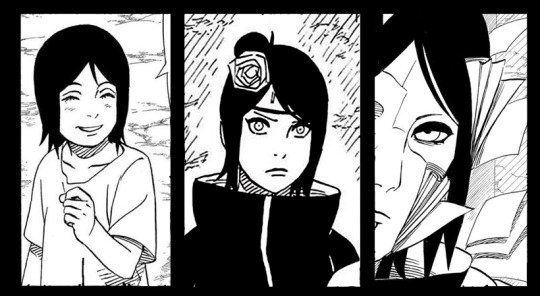
Also available in Russian: ссылка на русский перевод
Konan is possibly the hardest character to analyse because her stand-alone arc is the last one to appear, and the story doesn't dwell on her ideals and motivations until the very end - despite that, it's my personal belief she's one of the best female characters developed in the series. With a few exceptions, female characters in the Narutoverse will usually take the position of supporting the male characters - but unlike most of the other women, Konan's position of support actually makes sense with her character.
A person not being the "original creator" of the philosophy they follow or joining other characters to achieve a common goal does not mean they don't have a mind or will of their own; Konan is just as free to make her own decisions as the other characters.
While Yahiko takes the role of "fallen hero" and Nagato is the "unwilling protagonist", Konan is the ever-present observer; she's the last one to take the spotlight in the Ame Trio storyline, and with her, the last open ends are closed. Konan is the element which endured throughout all of the Ame Trio's different phases, from their start to their brightest and darkest points until the very end. She's the Angel, the one who will carry and reinforce the will she has received.
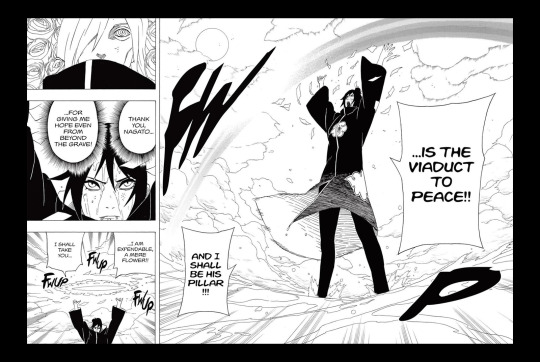
Konan has a moral trait which makes her strikingly different from Yahiko and Nagato; she is not loyal to abstract ideals, but rather concrete ones. Even though Yahiko and Nagato eventually digress on their philosophies, both dedicate their lives to the pursuit of peace and give up their lives to guarantee the survival of their goal, as abstract as it may be.
Konan, on the other hand, is loyal to people; of course she had beliefs of her own, but they mostly come from a local perspective, not a universal one. She's loyal to Amegakure; to her country, to her people, her citizens, her friends.
It's heavily implied in the story (more in the anime than the manga) that the people of Amegakure held her in high esteem (perhaps even more than they held Pain himself). This shines a new light on Konan, who early on the story was just an unknown villain of the Akatsuki - in fact, we come to learn most of the important aspects of her personality lie outside of the classic, evil Akatsuki.
To understand Konan it's important to understand the Ame Trio's dynamic as a whole; it's fundamental to consider that, just like Nagato, Konan owes her life to Yahiko's fierce will of surviving- her backstory alone with Yahiko is never shown but it's heavily implied that she was just as dependent on him as Nagato was. Like Nagato, her personality is much more passive and quiet until provoked.
Both Konan and Nagato were Yahiko's followers, and they were happy that way - they believed in his dream and his philosophy and found in the Akatsuki the meaning of their lives. It's important to understand that Yahiko's goals are also her goals, regardless if she was the one who created them or not; it's better to say he first inspired her into creating such dreams for herself.
Many other (very popular and loved) characters in the Naruto universe follow dreams and philosophies not originally created by themselves and are not perceived as mere "followers without opinion" like Konan sometimes is.
A common reason for the misunderstanding of Konan's character to claim she has no will of her own is that she continued to support Nagato even though he suffers an immense personality and philosophical shift after Yahiko's death. It's often wondered why Konan decided to stay by Nagato's side after Yahiko's death despite his radical change, and it's often associated with her having no ideas of her own. This is not true; the story builds a very logical and realistic reason for her to continue supporting him regardless of her truly agreeing with his new peace philosophy.
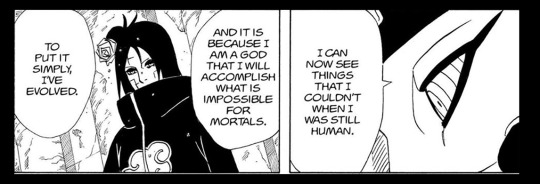
Very much like Nagato, Konan saw the people she loved and her reasons to live be taken away from her twice. The first time, it was Yahiko who gave both of them meaning and direction; the second time Nagato and Konan found themselves having nothing again - all they had was the legacy Jiraiya and Yahiko left behind.
Konan's life was saved by Yahiko twice; first when he helped her survive and second when he sacrificed himself so she could escape Hanzo's trap. It's important to realize the reason why Hanzo could trap Yahiko and Nagato is that they captured her first; although we have no evidence for this, it's possible Konan also felt guilt for "giving" the enemy a token to which they could manipulate Yahiko into obedience.
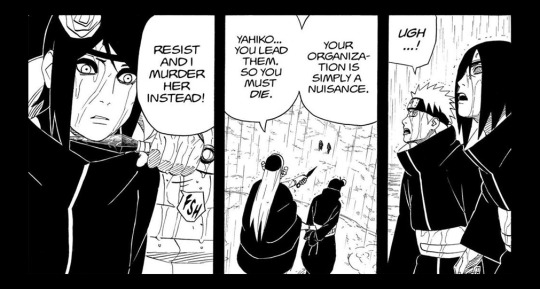
Yahiko being a key factor on her survival (both physical and mental) and her feeling responsible for his death are both factors that could result in her feeling immense guilt and a sense of debt with him. Like Nagato, Konan couldn't just let Yahiko's death be pointless after giving up his life for them.
Any reasonable person would have their hope shaken after seeing Yahiko get killed after his "non-violence, mutual understanding" philosophy failed. It would take an enormous endurance and faith to lose a person who she loved and keep on trying the same thing with the hope that "next time things will work as intended." Perhaps, things would never work as Yahiko imagined - perhaps his original plan needed adaptations.
However, unlike Nagato, Konan hadn't been conditioned by either Jiraiya or Yahiko to think that she was the one who would find the key to peace; she didn't spend her life pressured by the responsibility of coming up with a plan. Nagato was the one who the former leaders trusted would find the answer to end all the wars - and he stepped up to continue the "plan to peace" with his new ideas of how to get there.
And there's yet another important factor in all this; Yahiko had left her with a mission - the mission of supporting Nagato. The conversation where Yahiko entitles her with the responsibility of being by Nagato's side is highlighted in her fight against Obito to tell us, the audience, why Konan is so determined to help Naruto now - her mission of protecting the "savior of the world", originally given by Yahiko, had been transferred from supporting Nagato to Naruto.
Once we see the perspective of her feeling like she was in debt with Yahiko for saving her life twice - and adding love and guilt to the mixture, which makes it much harder for reason to overpower emotion -, it's easy to see why it could be hard to nearly impossible for her to dismiss the last mission she could actually complete; following Yahiko's will was a way of still being connected to him after he was gone.
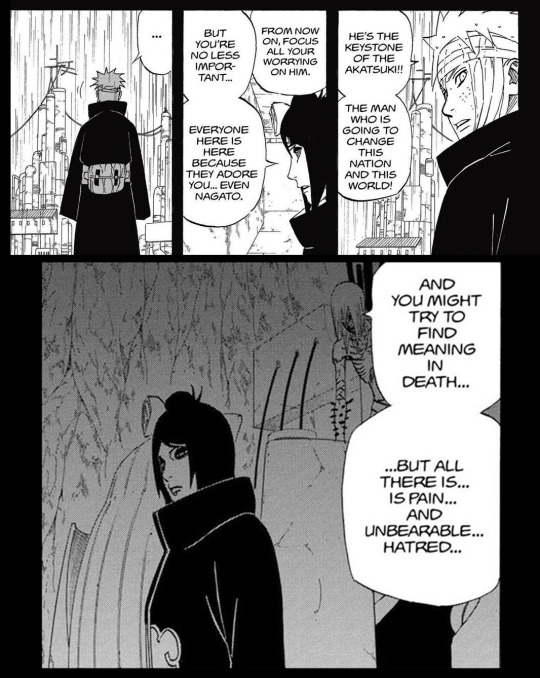
Both Nagato and Konan nearly lost the meaning of their lives when Yahiko was killed and the original Akatsuki destroyed - both clinged to what they had left. Neither ever had a proper environment to deal with the grief they felt, a grief that echoed a childhood trauma that shaped all of their lives.
All of these factors are reasons why it would be hard for Konan to look objectively at what she was doing by supporting Nagato's new philosophy; however, Konan wasn't just guilt trapped into being by his side.
Konan, as I stated before, is much more pragmatic than her counterparts; she's loyal to what is hers - her friends, her nation. Even if we ignore the guilt or the "mission", it's safe to assume she would have stayed by his side anyway; Nagato was all the family she had left, and she was loyal to what was hers above all else.
Perhaps, if the mental conditions weren't so harsh, Konan could have resisted or opposed some of Nagato's new radical ideas more than she already did - debated with him, perhaps they could have convinced each other to stay in Yahiko's path. In the anime, Obito even says he relied on Konan for "calming" Nagato, which tells us that she reasoned with him to some extent - however, neither of them were able to keep their pain from overriding the morals they previously had.
Konan has a mind of her own, and it's shown to us in the moments where she disagrees either visually or verbally with Nagato's actions; Jiraiya's death, Konoha's destruction and the conversation with Naruto are moments where she confronts him. She is shown disagreeing with Nagato on multiple instances, which is proof that she felt she could voice her discontent with him - that she didn't feel completely trapped by guilt or that all she had to do was simply obey him; she was not just a voiceless "Angel" obeying her "God." We're also shown that Nagato disregards many of her opinions - by the time he becomes a villain, he is extremely narcissistic and confident in his hability to make the right choice - but that doesn't keep her from voicing her disagreement anyway.
It's not clear to us, the audience, how much Konan was hurt by Nagato's disregard (we're shown she is uncomfortable to some extent); it's the combination of her guilt, Yahiko's "mission" and her own faith in Nagato's plan that keeps her following their goal.

All the members of the Ame Trio value the search for peace above everything else, each in their own particular way.
Unlike Nagato, Konan has a much clear and objective way of thinking, interested only in what will serve them to achieve their goal and dismissing everything else that will not be useful.
Konan is never shown having any interest whatsoever in the other members of the Akatsuki (she never engages in the conversations they have), in the people of Konoha (which is why she condones wasting energy on being violent with them) or even in what Naruto has to say. All that she cares about is what is hers - her nation, her family; she's completely indifferent to everything else.
(That being said, I must note we don't know how her relationships with the other Akatsuki work as it would be impossible for her to spend almost 20 years without interacting with the other members. One of Konan's most important traits is her kindness, so it's "in character" to assume she would treat them respectfully and kindly, being fond of them to some extent; it's also safe to assume she didn't care about them at all, given her behavior in the manga. I think both interpretations are equally canonical because they lean on different aspects of her personality to fill a backstory we're never shown).
Although Konan is never shown being especially inclined to violence, her indifference and disergard for everything that is not hers - together with her own belief on Nagato's plan and the suffering which she endured - allows her to be the cold-blooded leader and killer she eventually becomes.
Konan believed in Nagato - like both Jiraiya and Yahiko did - while recognizing his flaws. When Naruto received recognition and acceptance from Nagato, he was incorporated to Konan's definition of what is "hers"; she aligns him in a sequence of "saviors" who she believed, a sequence that began with Yahiko and continued with Nagato. She makes the conscious decision of giving up her life for her dream of peace as Yahiko and Nagato have done before her.

Obito is the example of a person who Konan never incorporated on what is "hers" - this is clear on their fight where she says she studied his moves and his powers all the years they have worked together, and also clear on the passive-aggressive conversation they have after Jiraiya's death (Chapter 407). The way their relationship works - especially considering that she spent approximately half of her life working with him - also shows that Konan doesn't blindly support other characters for the sake of supporting them; for all we know, she trusted him much less than Nagato did.
It's also in Konan's fight with him that we see her analytical intelligence at full bloom - I dare say she is the most intelligent of the trio when it comes to strategy; first, for not ever truly trusting Obito to begin with (possibly because Yahiko also didn't), and second for being able to set a strategy that effectively killed him (hence why he used Izanagi - he was killed by her) with information based on her own observations.

Konan is extremely careful and precise; she pays incredible attention to detail, being able to draw accurate conclusions after analyzing just a little information.
Konan isn't ever shown to be hateful or angry, with the exception of her encounter with Jiraiya, where she treats him with spite, taunting him with the idea that following Orochimaru's suggestion could have avoided all the trouble he was going through with the Akatsuki. It's one of the few times we see Konan treating anyone in a way that is not kind or neutral, as if she held some type of resentment against Jiraiya - I like to think she blamed him, in a way or another, for not preparing them well enough for the cruelty of the world; for letting them be so naïve that Yahiko could be killed in a trap easily avoidable. It's obvious that Konan still held Jiraiya in some regard as it's easier for people to lash out on those who they like the most - after many years interacting with people to whom she was completely indifferent (outside of Nagato), Konan was finally talking to a person she had feelings for.
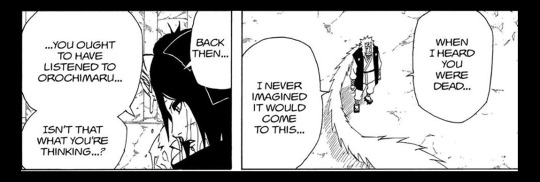
She is also - as described by Jiraiya and also viewed on the characters memories - a very kind, gentle, caring person; the very fact that she chose to save Nagato by sharing food with him shows her predisposition to helping others. Her kindness wasn't lost after Yahiko's death, but mostly replaced by the indifference she felt at everything that did not contemplate her goals, her family or her nation. After she accepts Naruto as being "one of her own" and sharing goals with him, she's quick to display kindness towards him and indirectly make amends with Jiraiya in the process.
As quiet, introspective person, Konan is very self-sufficient; although she is a member of the Akatsuki, she only interacts with them when necessary, probably spending most of her time alone or caring for Amegakure's business (as she shared both Akatsuki and Amegakure's leadership with Nagato and he was more active with the Akatsuki, it's safe to assume she cared for the other half). Her quiet, calmer nature matches that of Nagato; they could find understanding by having similar thought processes and also having a harder time processing their feelings, finding sympathy and comfort in each other.
Although I have mentioned that Konan might have felt a sense of debt towards Yahiko for saving her life, I want to highlight I see this feelings as possible only after his death because of its traumatizing circumstances; I don't think she felt she owed him anything while they were all alive, especially because it's never shown that he ever demanded such recognition. Yahiko and Konan have very distinct energies and personalities that complete each other, their relationship has a strong foundation because they share the same core beliefs and traits; loyalty and faith. I can see her falling in love with him for many reasons and one of them being by her admiring how hard he works to achieve the goal of peace.
Konan is a person that feels gentle and kind towards life as a whole; she doesn't seem to need much to be happy - as a child she made origami to pass time and have fun (and eventually used her intelligence to turn her passion into power); as an adult, the anime dedicates a scene to show her smiling to the rain while thinking of happy memories - happy for the sake of being in peace with the new direction she was taking her life after she and Nagato found someone to believe in again.
(Edit: Unfortunately I could not add another image to the post to illustrate this comment, but I wanted to talk about one aspect of Konan's personality that I like a lot and also forgot to mention. Despite her collected and serious demeanor, she also has a tendency to taunt people, a bit similar to Nagato's taste for ironic jokes. This is shown just a few times. In chapter 373, when Yahiko says he will save Nagato the next time something happens, Konan makes fun of him by remarking that Nagato is actually stronger than him, and she laughs when he gets annoyed. As I showed before, she also provokes Jiraiya with the hypothesis of things being better if Orochimaru had killed them. In her fight with Obito, despite his clear disinterest in what she was saying, Konan goes on to explain why Nagato and her betrayed him, and why he will never win. During the Water on a Frog's Face Training with Jiraiya she's also shown laughing at Yahiko's clumsiness. In my opinion, the way she evidently enjoys herself when she mocks people is strikingly contrasting to her generally unaffected personality, and personally I like that most of those times Yahiko was involved. Both in the anime, because of the animation, and in the manga because of Yahiko's surprise, I'm also under the impression that she was the one to initiate their kiss).
All of the Rain Trio's characters have very distinct and interesting psychologies; personally, I find Konan to be the most complex one because of the extreme discrepancies she displays, sometimes warm and kind, sometimes extremely cold and indifferent. I think the way she seems to only care about a very limited aspect of things is very attractive, as it shows how focused she is on her goals - as a nonviolent person, the most cruel act of Konan as a villain comes from her apathy to everyone else that is not part of what is "hers." Unlike Nagato and most of the other members of the Akatsuki who actively indulge in vile acts, she simply pursues her goals, removing anything and anyone on her way.
When he watch Konan's childhood, we see a child that is kind and light-hearted despite of all the pain she has endured, and only after being inflicted by yet another wave of suffering Konan's empathy and hope are shaken to the core; however, we learn her feelings were not dead but rather dormant, and it's by reconnecting to her core traits and beliefs that she finally finds peace in the very end.
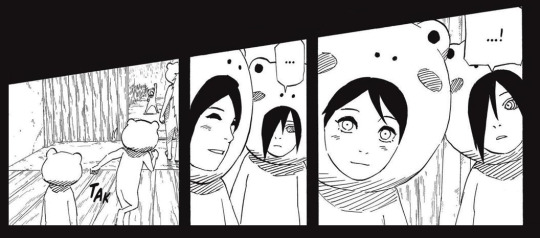
108 notes
·
View notes
Text
Tangled Salt Marathon - No Time Like the Past

While I wouldn’t call this the worst episode of the series, there are several others I dislike more, I would call this the most ill conceived story in the show.
All the other bad episodes have potential but are let down by poor presentation, boring predictability, or sloppy planning. This one however, is fundamentally flawed in it’s very basic premise and so ranks in the bottom of most fans lists. Even people who are far more forgiving of season three and than I am, and are hardcore New Dream stans, still dislike this episode. That’s how bad it is.
Summary: Rapunzel discovers Old Lady Crowley tossing out Cassandra's things. She is upset and demands that they be left alone. She then has Lance and Eugene help her save all of Cassandra's mementos and personal belongings, but she becomes saddened when Eugene reminds her that Cassandra turned her back on "her". Rapunzel takes a box of her things along with, unknowingly, a mysterious hourglass. As she examines it, she accidentally drops and smashes it and she and Pascal find themselves sent back into the past. They run into a teenage Eugene and Lance who keep calling Rapunzel "Sideburns". Rapunzel realizes that she and Pascal have inhabited the bodies of the Stabbington Brothers and decide to recruit the young thieves in getting the hourglass from the castle back.
Fun Fact! That Dummy is Rapunzel’s Doing
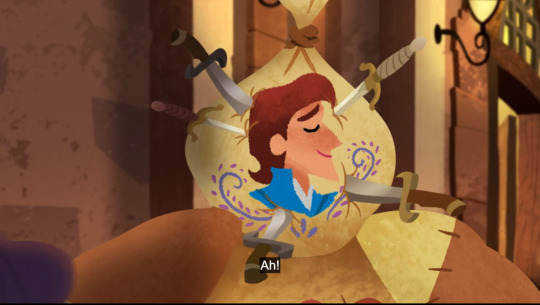
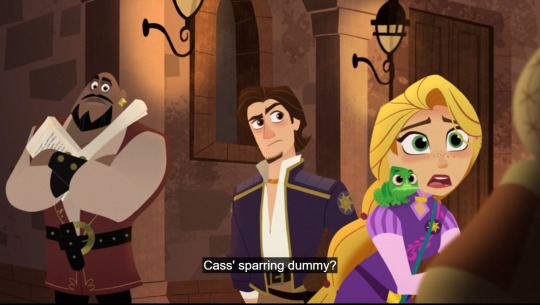


Minor nitpick here, but Cass had nothing to do with putting Eugene’s face on her sparring dummy. Rapunzel voluntarily did that back in Under Raps. Cas never requested it nor even expressed any joy over receiving said ‘gift’.
Basically the show is attributing one of Rapunzel’s mistakes/flaws to Cassandra in order to introduce a very nonsensical plot point later. So I need ya’ll to keep that in mind as we go along.
Lets Talk About the Episode’s Ordering
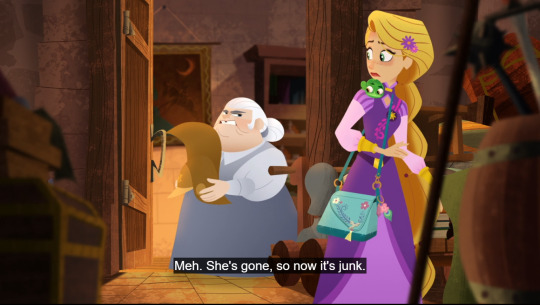

We don't have production codes for season three like we did for the previous two seasons. So we can’t know for sure what order everything was originally planned in, but I would argue that this episode should have came before Return of the King.
For starters this is a “bottle” episode; it takes place mostly in the past and the only present day characters who show up are Eugene, Raps, Lance, and Crowely. As such you could potentially slot this episode in anywhere before Cassandra’s Revenge. You can’t really do that with most of the other episodes so it could have been easily moved around when airing.
Therefore, I would argue that it should have been the first episode after Rapunzel’s Return for three key reasons.
It would have given Edmund time to travel to Corona and give Raps time to start up big building projects like fixing Old Corona. In fact she’s already approving building plans for the capitol city at the start of the episode. Which could even explain why she took so long getting to the castle repairs if she was taking care of the stuff that the Saporians messed up else where.
Rapunzel’s stance over wanting to keep Cassandra’s things makes more sense early on, both in universe and in a meta context. Raps would still have hope if Cass has only been gone for a month or two instead what would now be four or five months down the line. It also makes sense that Crowely wouldn’t wait around for that long. And from a meta standpoint, the audience would still be oblivious to what the heck Cass was up to and could theoretically side with Raps better; or at least empathize with her view point more, even while disagreeing with her.
Events in this episode better explains Eugene’s decisions in Return of the King and gives the audience more context for certain stuff.
So Why Is There a Random Magical Time Traveling Hourglass in the Storage Vault?
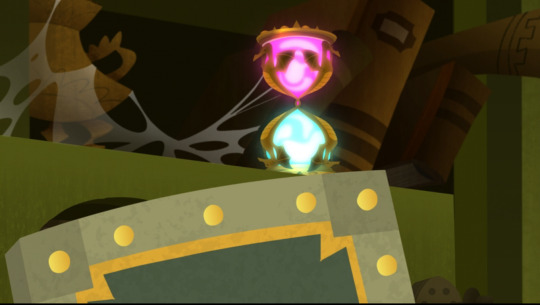
Slowly but surely the series has abandoned all pretense that there’s any logical world building in the show. Magical things just appear randomly now without any explanation whatsoever. Worse than that, things like the hourglass and map to the cursed tomb are treated as if they were always there, unlike the magical beings that they happened to run into in past seasons.
The problem with this is a lack of consistency. You can’t have sceptics like Eugene and Varian if magic is so common and wide spread that anyone can run into it at anytime. Not to mention it diminishes the specialness and importance of the sundrop and moonstone if powerful magical items can be so easily found and stirred, undermining important plot points and the tension surrounding them.
But most frustrating of all, is that this could have been easily fixed by just stating on screen at some point that magic attracts other magic. Meaning it’s only Rapunzel herself who routinely runs into these things and not just everybody and anybody.
None of This Stuff Holds Any Meaning

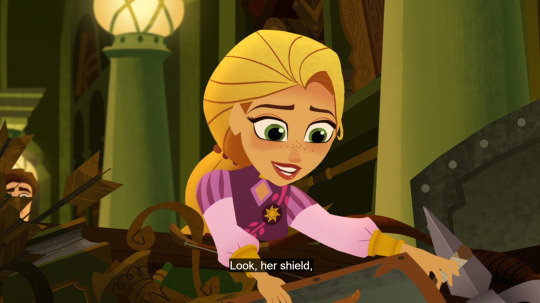
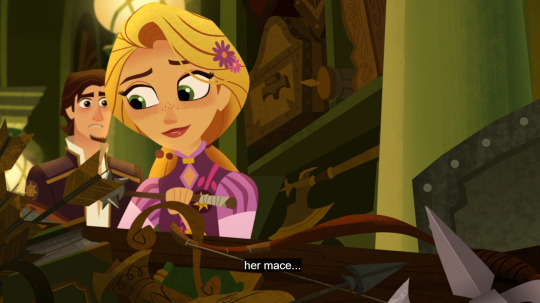

Show don’t tell!
At several points through out season three, both Raps and Cass morn over Cassandra’s left behind things. They tell us constantly that these objects hold significant meaning to them, but I, the viewer, have no damn clue as to why.
We were never shown on screen what was so special about these things other than the fact that it was junk Cass collected. There’s no story attacked to these assortment of objects nor any previous indication that Cassandra valued them beyond their usefulness. As such, any scenes involving her stuff fall emotionally flat.
Eugene is the One in the Right Here.


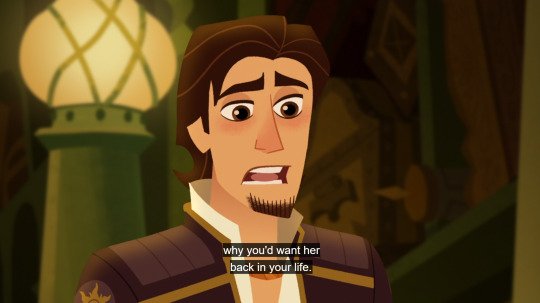
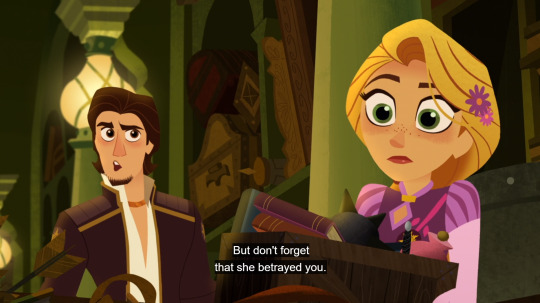
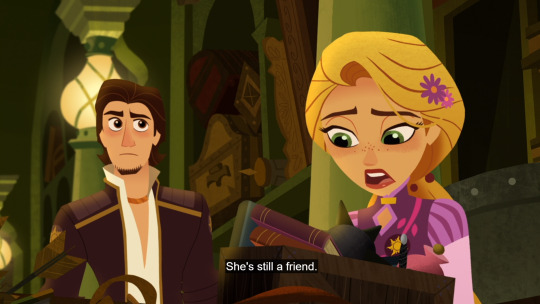

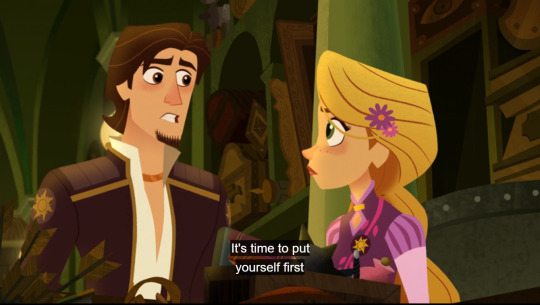

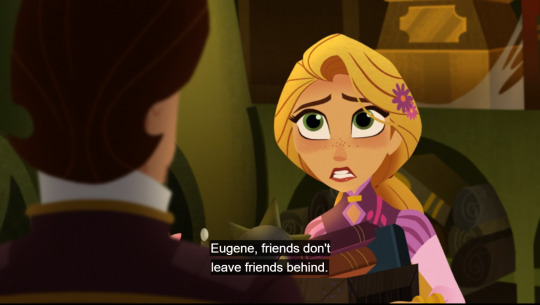
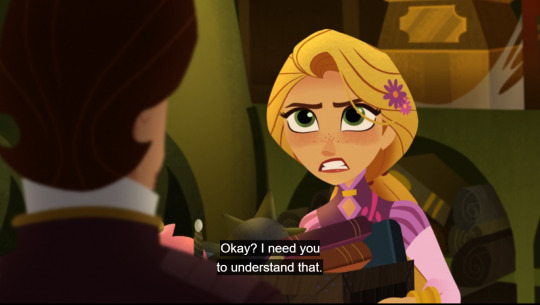

Eugene’s right.
Any well adjust and mature adult will tell you he’s right.
If someone doesn’t want a relationship with you, than that’s it. There is nothing you can do but to move on. It sucks, but its life. To ignore that is to ignore someone else’s boundaries and personal autonomy; while also devaluing yourself and you’re own needs.
In a competent show this would be a set up for Rapunzel to learn something about letting go and taking care of oneself emotionally.
But this isn’t a competent show.
But Lobster is for Poor Folk

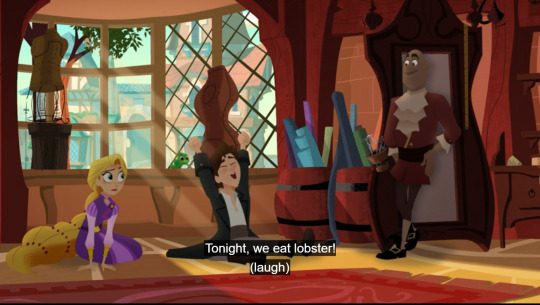
Food history time!
Lobster, and shellfish in general, have been considered low class food for centuries. Especially around costal areas like Corona. It’s easy to attain, cheap, and not regulated like hunting was in much of Europe. In America, specifically, lobster was fed to prisoners and there’s historical accounts of riots being started over it.
Heck, less than forty years ago, no one lived on the coast but poor people. That’s why there’s historical communities of black people living on the southeastern islands in the US and why my father grew up in the swamps of Alabama during the 50s and 60s.
The gentrification of coastal property and seafood, like lobster, is a very recent phenomenon in human history, starting in the late 70s early 80s with the booming tourism industry and increasing globalization.
So while I understand that the joke here is meant to be reflective of our current understanding of lobster being a status symbol, in universe, it’s the equivalent of Eugene getting excited for chicken nuggets instead of his usual bowl of cereal because the story takes place before the 20th century.
This means that these kids are so poor that fucking mcdonald’s fast food would be considered a rare treat compared to the slop they usually eat. Yet again what is meant to be a lighthearted joke turns suddenly dark when you stop to think about it for all of two seconds all because the writers are so flippant about their world and characters.
This Wasn’t Planned Out, So the Timeline Doesn’t Add Up Anymore and Resources are Wasted

Remember the flashback in The Return of Strongbow?


Now I need you to remember that season three is two years later from season one and the movie. Eight years ago then, would be ten years ago now.
The Eugene and Lance in the bottom picture is suppose to be roughly the same age as the Eugene and Lance in the top picture; give or take a few months.
I know teenage boys can grow fast, but not that fast.
Eugene at 16 looks the same as he does at 26. All because the writers were too lazy to preplan things out ahead of time.
We should have seen the teen models with recasted voices back during that first flashback if they were going to tell this story later. Or the previous plot point should have been less than eight years ago.
In fact the first flashback no longer makes any sense being so many years ago given Eugene’s engagement and recent breakup with Stalyan, and the later reveal that he was working for the Baron during the original movie.
Sloppy planning like this not only makes for a confusing timeline but it also wastes limited resources. I like the new models, I like the actors cast for these younger roles, and I do like the concept of seeing more of Eugene’s past. But going through all of that trouble and money for what amounts to one throw away episode is mismanagement of the budget and work schedule.
Baby Varian Is the Episode’s Only Saving Grace
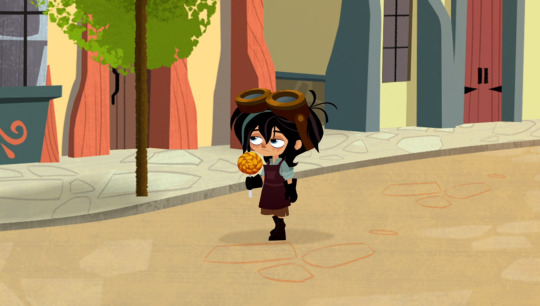
I know people are divided on the deign here. Some love it and some hate it, but that’s a personal taste thing. The actual scene itself is golden either way, because it’s such a funny eater egg. Fans on both sides made memes out of this for days. It’s legendary.
Personally I’m more in the ‘love it’ camp, though I can see the issues people have with the design. My main defense of it is more the fact that we got kid designs for the other OCs in the show and it’s only fair Varian got one as well. The fact that he’s in smaller versions of the S1 clothes doesn’t bother me anymore than when Lance ran around for two seasons in the same outfit, including when he was a kid.
So if I like it, then why am I talking about it a salt review?
Cause the most memorable part of an episode shouldn’t be a throw away gag!
People bring up baby Varian way more than they do about anything else in the episode, and no it’s not just because the character popular. It’s because most would like to forget what comes after this scene.
Where is Quirin, by the Way?

Why is your six year old son running around the big city unsupervised?
This wouldn’t get talk about as much it wasn’t for the fact that Quirin being neglectful in season one was a motivating factor in his conflict with Varian. A conflict that was suppose to be resolved back in Rapunzel’s Return but we the audience have yet to visually see any difference in behavior since then.
Quirin’s absence here in the past highlights his absence in the present day and reminds the audience aware that we’ve not been given a satisfying conclusion to one of the most important arcs in the series.
Lets Talk About Wasted Potential
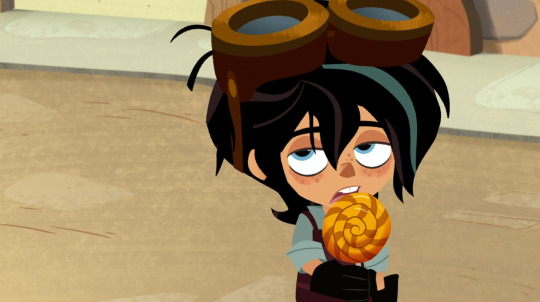
Like I said, I like the idea of exploring Eugene’s past. But we should have gotten that back in season two when it was more relevant. Part of why this episode fails is because Eugene has reached the end of his original character development. He’s now on an identity crisis arc which has nothing to do with this episode.
But you know who still hasn’t finished developing? Rapunzel.
Rapunzel has lots to still learn and viewing her past through outside eyes could have turned this story into something really special. Especially with the ‘inhabiting another body’ plot point.
You have no end of options here,
Have Raps inhabit Cassandra’s body for a day and gain insight into what motivates her. It could have been either before or after they met, both offers up possibilities.
Have Raps inhabit Eugene’s body and experience what he had to deal with growing up and come to see his point of view. (This could have also worked with the Sabbingtons set up had the writers not been stupid.)
And my personal favorite, send her back to right after Queen for a Day and have her stuck in either Varian’s or Ruddiger’s bodies. Force her to see what she did to him and have her acknowledge she was wrong.
And those are just the most obvious choices, there’s other more out of left field things you can do that would still work with good writing. Like exploring Lady Caine’s past, inhabiting Arianna’s body and learning how to be a real queen, get dumped into actual young Gothel and lay out clues to the future Zhan Tiri plot, or possess one of the Brotherhood and experience the final days of the Dark Kingdom; the list just goes on and on and on.
But I Thought You Didn’t Put Kids in Jail Frederic?
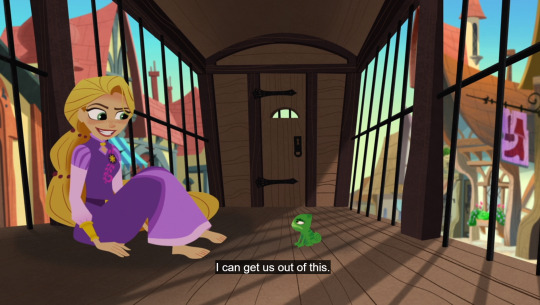
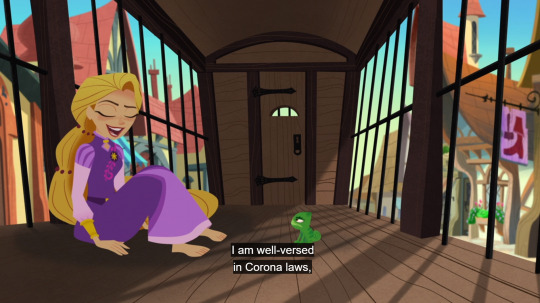
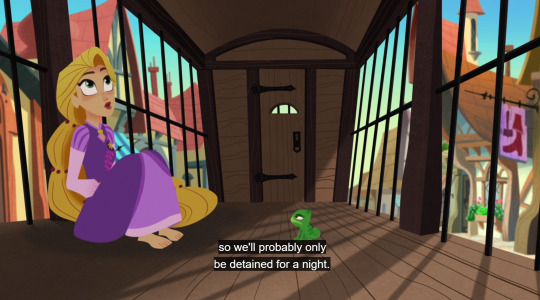


Remember that Raps and Pascal are possessing the Stabbingtons who are still teenagers here. They can’t be much older than Varian.
This means that Varian isn’t some special case. Teens have received harsh and deadly punishments in the past for non-violent crimes like theft.
Also teens are called kids still by the majority of the cast. They’re aren’t considered adults with the same rights as someone in say their twenties, yet they can be punished the same as an adult would. Which is horrendous in any time period.
So in conclusion, Frederic is a fucking liar!
Tangled the Series can’t decide if it’s in the far past or a reflection of the modern day. As such it winds up supporting the worst of both worlds. Barbaric practices like hanging for minor crimes and prison slave labor are treated as the norm and never called out for the horrific things that they are; treated as a joke even, but we’re suppose to accept that this world also somehow views adolescence through the lens of late 20th century sensibilities even as it forces minors to go through such atrocities.
Like what are you trying to say show? What is your message on the transition of adolescence to adulthood regarding rights and responsibilities? And don’t tell me ‘it’s not that deep’ because this is suppose to be a coming of age show! That’s the entire premise of the series!
So How Old Are Stan and Pete Again?
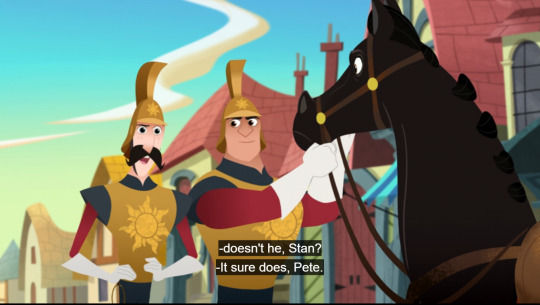
I was always under the impression that Pete was a newbie guard, closer to Cass and Eugene’s age than say Cap or Frederic. That’s why he screws up so much because he’s inexperienced, why he seemed to be the closest thing to a equal colleague Cass had in the guard when she was also just starting out, and why I assumed those braided girls from the movie were his sisters.
I mean there was nothing on screen previously that would necessarily contradict this reveal, it just doesn’t feel right, that’s all. I guess he could be like 20 here and be 30 in the show. That would make him only a few years older than Eugene, but still doesn’t explain why he’s so useless a decade later.
I’m fine with Stan being here though. I always thought of him being the older of the two. In fact I headcannon Willow as his mysterious wife that he talked about back in Monty’s episode during season one. (She’s Stan and Pete’s beard, and they’re totally in a open poly relationship. That’s why they’re allowed to stay in the royal guard despite being so incompetent cause they’re technically Ferderic’s in-laws and Rapunzel’s uncles. Just no one ever talks about it cause it’s a minor sandal for a princess to marry lower class and Willow’s hardly ever there.)
And Why Does Xavier Have All Those Plot McGuffins?
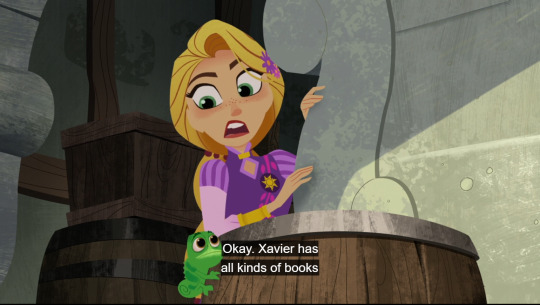

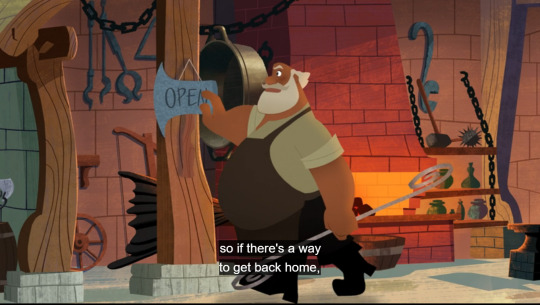
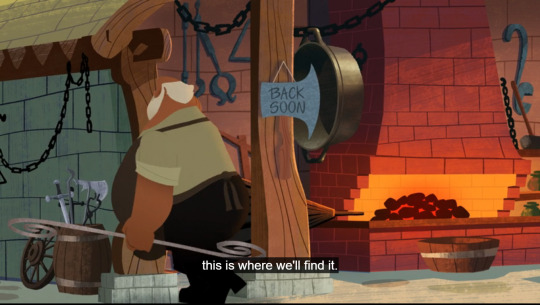
I know we’ll never get an answer, but at this point Xavier’s exposition fairy powers border upon ridiculousness. It’s just lazy and a waste of character.
So How Does Time Travel Work In This?

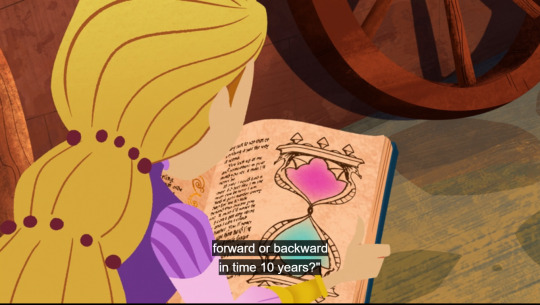
There are three types of time travel stories in fiction.
First is the ‘Changeable Past, Changeable Future’. You see this in Back to the Future. What you do in the past will change the future, i.e. your present. You may or may not remember that you did it, but be warned you could change things too much and break stuff. Like erasing yourself from existence, or ruining your love life ect. The only way to fix it is to go back in time again and change stuff again. But beware of paradoxes or you may destroy the universe altogether.
The second is the ‘Alternate Timeline’, where changing things creates new realties and it’s a matter of finding the right reality again. The tv show Sliders is a great example of this. Each new timeline is a different dimension. What you do in one won’t effect your original point of origin, only that particular world. The challenge if often getting home again because the probable diverging timelines are infinite and the changes of getting back are a zillion to one.
Third is the ‘Closed Time Loop’. No matter what you do nothing will change. The future is inevitable and whatever you do in the past was always meant to happen anyways. Gargoyles handles this really well. You can also have ‘fix points’ where certain important things are set in stone but small things can be changed like in several Doctor Who episodes. Braking a fix point breaks the universe once again, while paradoxes are often the solution rather than the threat.
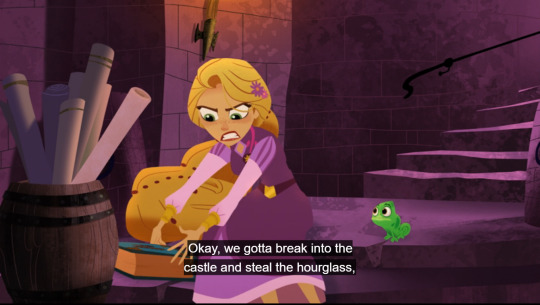
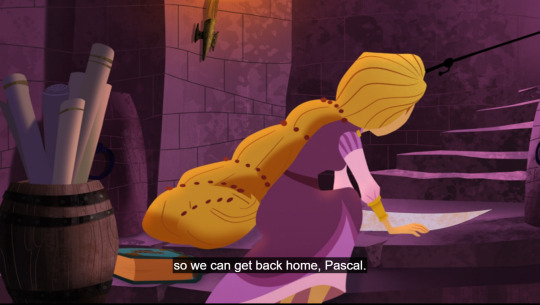
So which type of time travel is Tangled dealing with here?
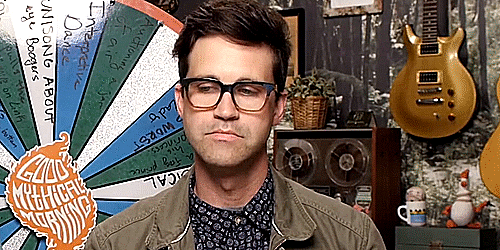
Scenes like the conversation regarding Pete’s and Stan’s mustache or the ones involving Eugene working on his smolder suggest a closed time loop. Yet the ending to this episode reveals a changed future. Further still the grandfather paradox revolving around the hourglass would make you think an alternate timeline yet, we’ve no indication that anything else changed other then Eugene’s opinions on Cass, and Raps shows no concern about getting back to her original point in time indicating that it actually isn’t another dimension.... so what is it then?
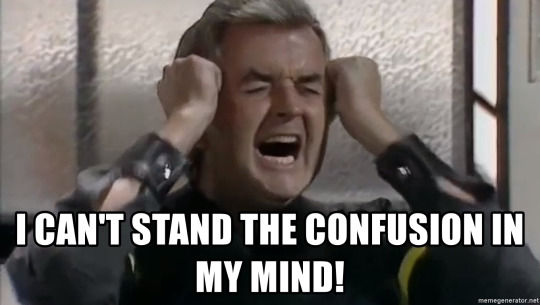
You don’t have to have a tightly plotted time travel story to have an entertaining piece of media. Endgame is riddled with plot holes and contradicts itself constantly, but what it lacks in coherent plot it makes for with fun characters, emotional story beats, and good pacing that manages to balance the action with the drama while hiding the cracks just enough that you don’t lose immersion.
Tangled however fails at even this because it gets the character beats so fundamentally wrong. Like you may dislike where the characters ended up in Endgame, but can’t say that those developments didn’t match the characters’ previous storylines and logical trajectory. Tony finally becomes the selfless hero by committing the ultimate sacrifice, Steve learns self care as a mirror to Tony’s arc as they were always parallels to each other, Bruce learns to accept himself, Thor processes his grief and lets go of the role he was assigned at birth but never truly fit into, and Nat becomes the leader she was destined to be rather than the sidekick.
What happens to the characters in this episode however makes no sense.
This is Another Missed Opportunity to Explore Eugene’s Past
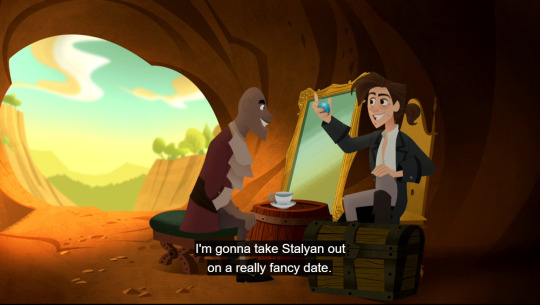
The other problem behind the episode is that we don’t actually learn anything new. If you’re going to promise a story focusing on Eugene’s past then I expect to actually glean some new insights.
We still don’t know why he’s working with Baron or how he fell in/fell out with him, what his relationship with Stalyan is like, how he became so cynical; not just the general basics, like the orphanage, but that point in his life where decided that survival meant giving up his morals and ethics; where did he first learn his better ethics that he originally suppressed (cause it sure as heck wasn’t Rapunzel), and when did he and Lance become separated?
This are questions that series decides to raise by making allusions to them and building conflicts off of them but never wants to explain the details of where they originated from. It’s super frustrating and wholly unnecessary. If you didn’t think the story of Eugene’s past worth telling then why did up repeatedly bring it up Chris?
Why Are You Surprised by This Rapunzel?
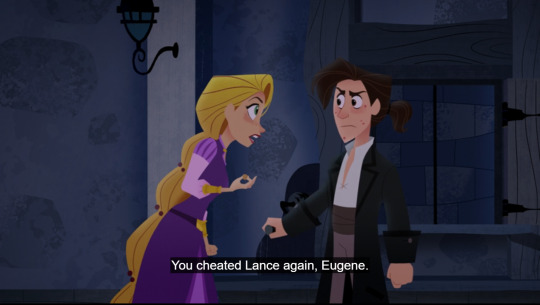
Rapunzel you know Eugene’s past. You know what he used to be like. You were literally there in the movie and saw him being an ass before this. You didn’t start to like him until he dropped his guard down in the flooded cave back when you both where about to die.
You fell in love with him when he showed you his real self and he fell in love with you when you proved that you were accepting of that. You earned each others’ trust. This here; angrily yelling at him and judging him, when you’re already hiding who you really are from him both literally and figuratively, is a breaking of that trust.
Who the fuck are you any more, Rapunzel?
Cause you’re not the same character from the movie. You’re not even the same character from season one. But whoever hell you are now, it’s not an improvement I can tell ya that.
So How Did The Hourglass Go From the Treasury to the Basement Storage, and How Would Raps Know It Was There At This Point and Time?
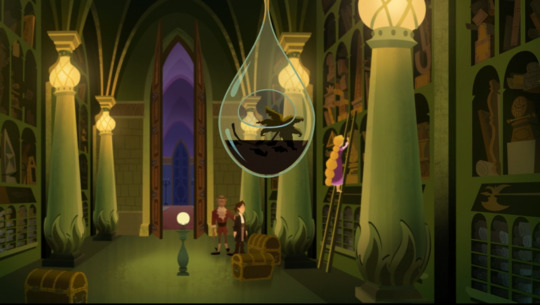
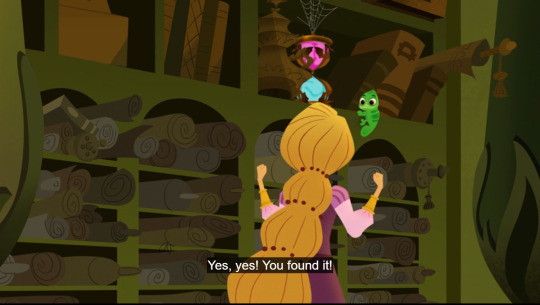
I’m guessing the implication here is that Crowley put Cass’s stuff in the vault, but like why the fuck would she do that? We’re not talking about a family attic here, but the royal safe. The most heavily guarded room in the castle with the kingdom’s most priceless treasures and antiques. Nothing Cass owned was that valuable.
Rapunzel Is Full of Shit
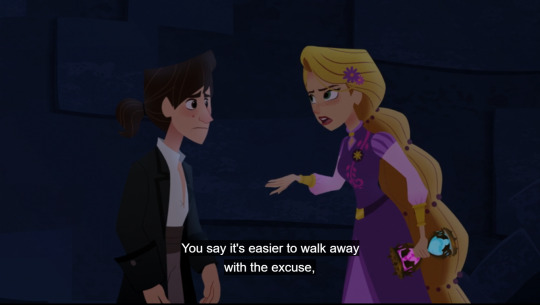
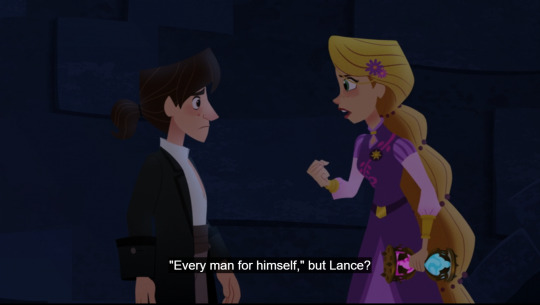


Oh let me count the numerous ways in which this whole lecture is stupid.
Rapunzel left Varian behind. Rapunzel left Varian behind multiple times, including that time he was thrown in jail. She was not a good friend, and no, this is not a case of her learning from her past because not once has she ever admitted that she was wrong to do that. So this scene just makes Raps look like a hypocrite.
Eugene does not need to relrean a lesson on being a better a person. He did that during the movie and has progressed beyond that point. This ‘lesson’ is a waste of time and a misuse of the characters.
This reframes Rapunzel as being in the right during her argument with older Eugene at the beginning of the episode, even though she’s not. In fact this is such a counterintuitive plot point that it boggles the mind.
Who structures a narrative this way? Why so blatantly point out how the main character is wrong if not to have her learn something? Why frame the story to make the person who’s personal conflict isn’t even the episode’s focus, into the one who needs to learn something? Especially if that something is already a lesson that they’ve learned on screen beforehand.
And why, oh good heavens why, would you teach children such a toxic message?
Like on the surface it sounds like something you’d hear in a children's show, but the context of it is justifying harmful behavior where you selfishly ignore other people’s wishes and boundaries just to satisfy you’re own personal desires.
And finally, Eugene and Lance do not work as a parallel to Raps and Cass. Cassandra is an adult who left of own free will. Lance is a teenager who was arrested due to Rapunzel’s own actions. Eugene isn’t the one who is responsible here, its Rapunzel. Who also left them both behind in her carelessness.
Secondly, Eugene’s decisions are spurned by years of trauma and a healthy fear of dying, while Rapunzel’s is wrapped up in her own need to always be right and to keep her immature and fanciful outlook of the world intact. As harsh as it seems, what Eugene did was based off a predetermine agreement and presumably Lance would have acted the same way or been pressured to act the same way by Eugene.
In short, Eugene’s cynical world view as a teen is not the source of his disagreement with Rapunzel but an adult perspective back by common sense and a respect of others choices. It makes no sense for present day Eugene to ‘learn’ anything from this misadventure that he didn’t already know and for Rapunzel to not learn anything that would actually tie the parallel together.
Locking Another Teen Inside a Jail Cell With Another Adult as a Joke, Does Not Erase the Inappropriateness of Varian’s Story

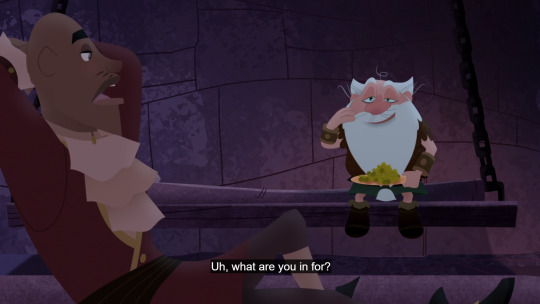
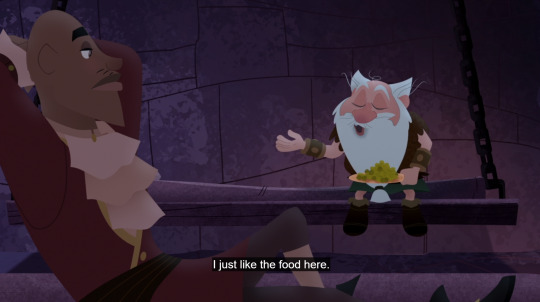
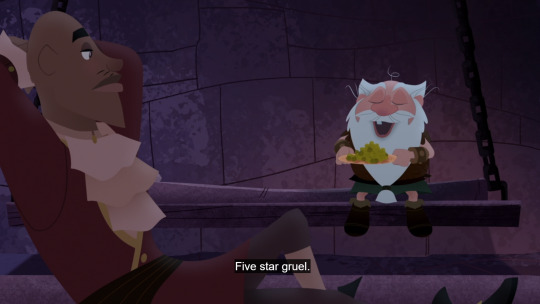
The episode tries to add another joke about Shorty sneaking into the prison without the guard knowing, but that still doesn’t excuse the fact someone had to have tossed Lance in there with him on purpose. Otherwise Lance wouldn’t have assumed Shorty was a fellow prisoner if he or the guard that locked him up saw Shorty sneak in before then.
Furthermore Lance’s nonchalant response suggests this is not an out of the ordinary occurrence. Nor do any of the other guard comment upon the irregularly of teens being jailed with an adult. Now add in the fact that the show fails to clarify that previous ‘cellmate’ line from Rapunzel’s Return and now gives us more confirmation that Varian was underfed and malnourished for a year with that gruel joke and you have a horrifying picture.
Shorty might be non-threating, but that doesn’t mean Andrew, a known attempted murderer and manipulator, is too. Nor any other adult who previously was housed with a teen before then. This is still very much not okay and no amount of ‘jokes’ will suddenly make it right.
Raps, Who is an Adult, Just Physically Threatened Two Teenaged Boys and It’s Played as a Joke....


How many times do I have to say it? Humor does not fix bad writing. I’m not laughing when a heroine at age 20, threatens a couple of kids for merely annoying her. Especially when said heroine has a history of abusing children; because let me repeat once again, neglect is abuse!
This is a Lie
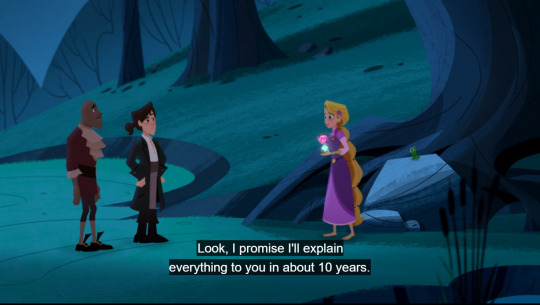
No you wont.
Rapunzel never tells Eugene what happens on screen. I suspect that if she ever did, they would no longer be together, because what she wound up doing here was a violation of trust and boundaries in the worst possible way.
And This is Now a Time Paradox

A Grandfather Paradox to be specific. How can Rapunzel be here in the past to break the hourglass if the hourglass that sent her here is broken?
In a competent series this would be the point of a future conflict and not the actual resolution. It’s not a closed time loop because of the paradox and the changes we’ll see in the future.
So either she’s in an alternate timeline/dimension and just doesn’t gives a shit; leaving the real Eugene, Lance, Cass, ect. to go on without her; or she’s just broke the universe and everything is slowly unraveling around her; galaxies are dying as she whines about being dumped, people in the future are being eased from existence, and God is cursing her name for ruining his creation, all the while she carries on oblivious to the destruction in her wake, as usual.
That’s it. Those are you’re only two options now. Is everyone from here on a fake copy or is Rapunzel the damned destroyer of worlds? You decide.
So This Confirms That the Stabbingtons are Indeed “Family”


Another reason why I place this before Return of the King; it explains why Eugene considers the Stabbingtons ‘family’. Though if it was Rapunzel he actually bonded with and not the real Sideburns, then how much of his feelings are real and how much of them were fabricated by her? How much agency did this episode steal from him?
So What Exactly Did We All Change?
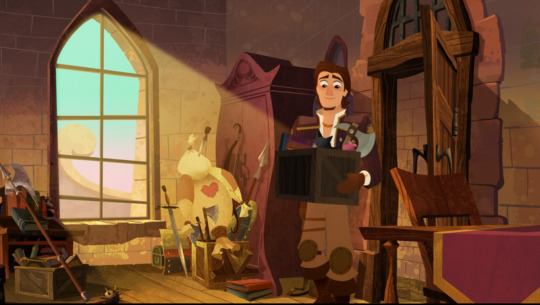
Well the dummy no longer has Eugene’s face, but Cass’s painting of the three of them still has him ripped out of the photo, soo... Keeping in mind that Raps painted the dummy anyways and considering that Moonandra tries to kill him later on; I’m going to guess that Cass’s feelings weren’t actually altered. If anything their relationship might actually be worse now, cause Cassandra keeps acting like she’s never had friends and Eugene has taken up Rapunzel’s blind devotion.
All that development in season one is just, poof, gone. Also it’s quite possible that the first movie as well has now it has been erased from existence as Eugene got his needed character development eight years too early. How the hell that’s suppose to work, I don’t know.
Outside of the that we get no confirmation how anybody else was effected, even though a more brainwashed Eugene running around would undoubtedly have caused a butterfly effect. Don’t expect that to be explored anytime soon.
Though, it would explain why he’s suddenly such a doormat in season three, if this was the second episode as theorized.
No! This is the Wrong Lesson!!!
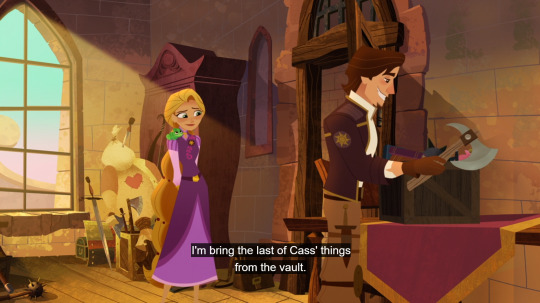

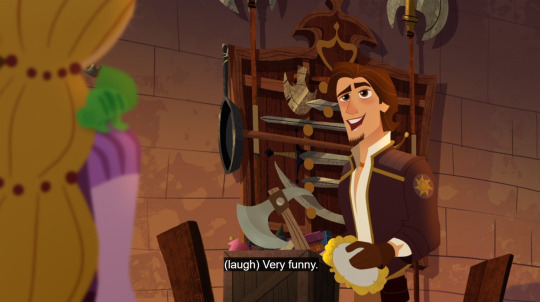
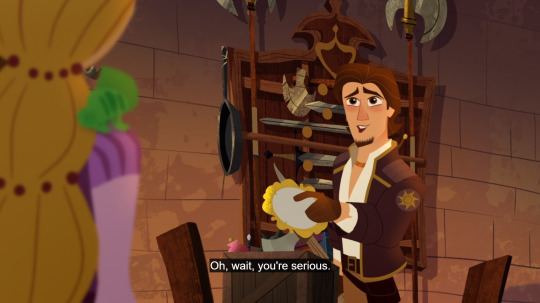
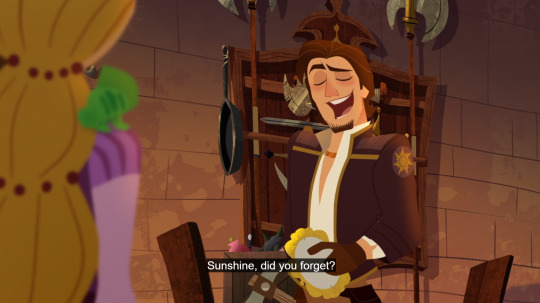
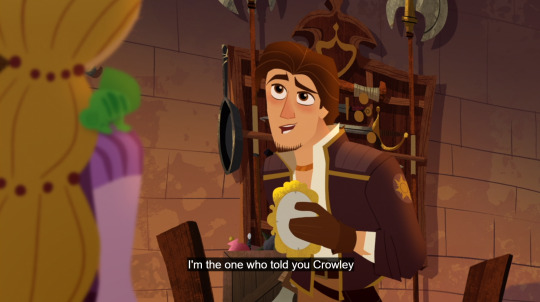
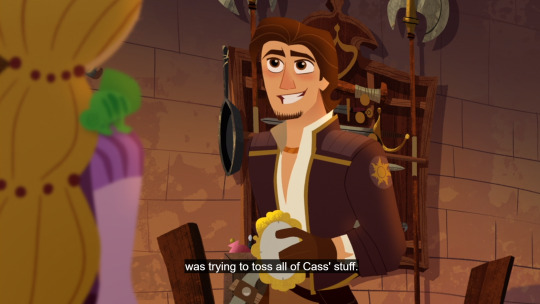
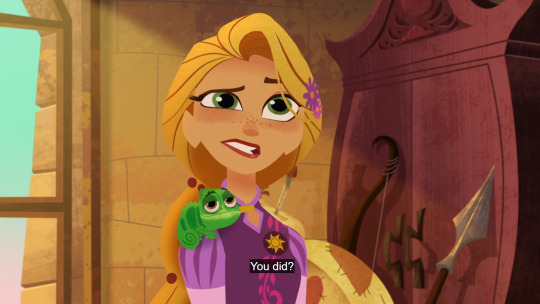
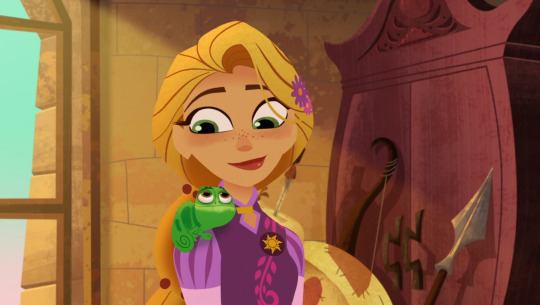
Let me explain narrative promises.
Everyone, on some basic fundamental level, understands how stories work. We hear them recounted to us over and over again from the day we're born to the day we die. It’s integral to how we communicate as human beings. Everyone knows innately how to tell a story even if that person couldn’t tell you how stories or structured or what certain literary terms mean, but they do it every day just through speaking. And while most audiences can’t always pin point what upsets them about a story they can for sure notice when things are off and not satisfying to experience.
Now that doesn’t mean that everyone can write an awarding winning novel, that study of a craft isn’t important, nor that every amateurish critique thrown at any given media is valid. But it does mean that people have come to expect certain storytelling practices and can pick up on narrative cues. We’ve familiarized ourselves with the language of film, novels, comics, ect, into order to comprehend what’s going on.
Rules of writing are just following that established language so that the audience can keep up. You can break these rules, sure, but unless you know what you’re doing and have a good narrative reason to do so, then you can easily lose you’re audience. And if you’re making money off said audience that’s something you want to avoid.
A narrative promise is a cue; a set up that lets the audience know that ‘hey this is important, pay attention to this cause it’ll come back into play later’. Now that the audience has been alerted to the plot point they expect fulfillment of the promise. If you break that promise, either through poor set up, lack of follow through, or by breaking an established convention of writing for no other reason then because you just wanted to, your audience is going to walk away unsatisfied.
The argument at the beginning of the episode was a narrative promise. It was a cue that set up the interpersonal conflict of the main character. For add context, I know that this is a coming of age story. Convention would dictate that the protagonist would resolve this conflict by learning they were wrong.
That’s not what happened here.
Convention was subverted. It wasn’t the protagonist who grew and change, it was the person they were in conflict with who did. And it wasn’t subverted because of any greater narrative reason, or future pay off, or even as effort to be shallowly ‘clever’; it was subverted because the author just didn’t want to hold the main character accountable for anything. Because said character has now become his avatar for his wish fulfillment fantasy and having the main character admit fault would be to admit fault in ones own self. Rapunzel doesn’t feel like Rapunzel this season because she’s just Chris in a wig.
The episode broke a narrative promise to the audience; both within the episode and in the greater premise of the story, because of ego.
I don’t claim this episode is bad just because of personal taste nor because I find it morally repulsive (even though both those things are true), I call it bad because it exhibits bad writing. Plain and simple.
Way To Undermine The Entire Point of the Original Movie, Show
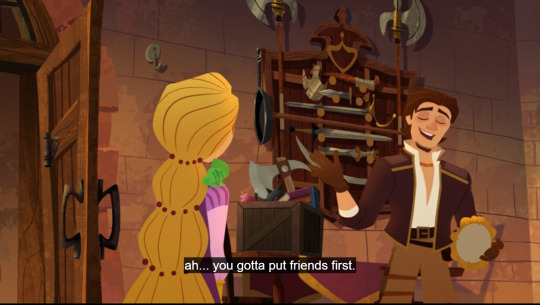
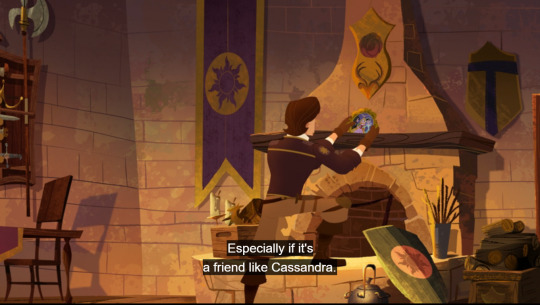
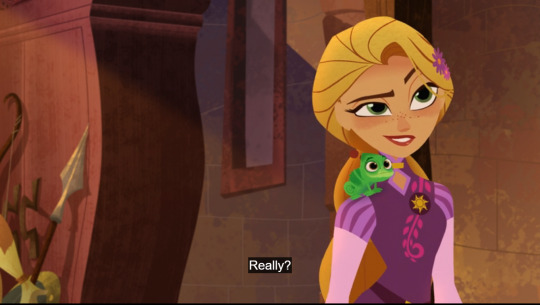
Speaking of breaking narrative promises....
TTS is suppose to be a squeal to the original movie. It’s even in the title of the show; both of them. In one fell swoop, the series has managed to sabotage it’s very reason for existing, as it erases Eugene’s motivation and the inciting incident that kick started the film.
Way to fucking go.
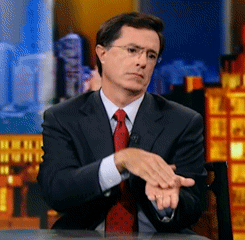
To further twist the knife, it diminishes the duel protagonist of said film in order to prop up a series original character, who isn't even present in the episode itself.
I don’t mind Cassandra’s existence. I don’t even mind her being the new deuteragonist and one of the main villains; even though she wouldn’t have been my first pick to fulfill those roles given her lack of set up. But I do fucking mind it if she upstages other characters and/or derails their character arcs in the process.
This is the Death of New Dream

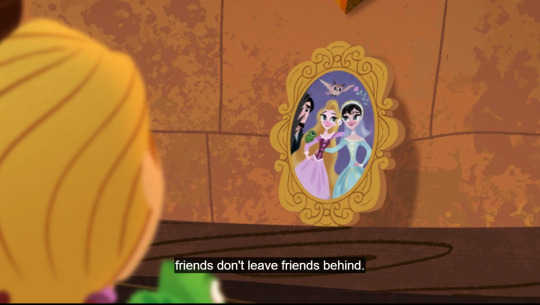
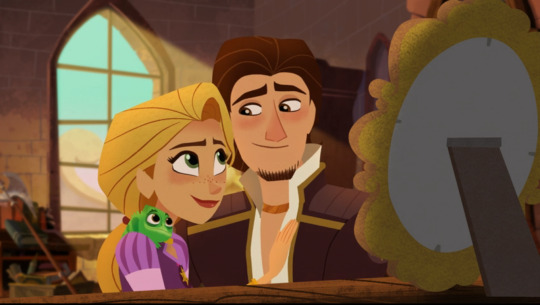
I was still in denial when this episode first aired. I honestly believed that this and The Return of the King was build up to a third “betrayal” where Eugene finally became fed up with Rapunzel’s bullshit and joined forces with Zhan Tiri. I thought the end of the series would have Rapunzel apologize to everyone she did wrong, Varian, Cass, and Eugene, in order to break ZT’s hold on them, and that true love’s kiss would reunite the sundrop and the moonstone and that would just tie everything together into a neat little bow and give us a truly daring character study of a Disney hero.
Oh dear merciful heavens, was I ever wrong.
How did we go from season one’s challenging and mature storyline, complete with Disney’s first real anti-villian, to this?!
What the hell happened!?
Rapunzel not only disrespects Eugene’s opinions, violates his privacy and trust as she manipulates him as a teen, and then brainwashes him to think like her (even if accidentally), but doesn’t even have good grace to tell him. She instead has the audacity to look all happy and self congratulatory because she got want she wanted. She, and the show at large, doesn’t care what evil thing she does to get the desired outcome Rapunzel wants.
Rapunzel in this show is a spoiled brat. And the image of her and her now lobotomized boyfriend staring dead eyed at a picture of the creator’s previous waifu OC with plastic smiles on their faces, sums up this series perfectly.
Conclusion
This isn’t even the worst episode of the series guys. I don’t know if it would even make it onto a bottom five list. That’s how much crap I have to wade through when it comes to this show. This is however the most damaging episode to the franchise as a whole.
Not even the most hardcore of New Dream fans want to acknowledge the existence of that final scene, and Rapunzel stans won’t defend her beyond, ’well she didn’t mean too, it’s the writing that’s bad.’ Yeah, the writing is bad, that’s why the character can’t and shouldn’t be defended, not here and not in other badly written episodes where she also does bad things and never makes up for it.
Anyways I’m finally caught up to where I left off, before the move, though sadly I don't think I’ll get this series done by the end of the month like I had originally hoped. But if you would like to help out I have a ko-fi you can drop a tip into if ya want.
https://ko-fi.com/rachelbethhines
92 notes
·
View notes
Note
Well, are you going to fill us in on "why we are morally obligated as a species to some day blow up the Earth"? Sounds like a supervillain backstory
(This was originally inspired by qntm’s fantastic satirical essay, “To Destroy The Earth,” but I disagree with him on a few key points. I highly recommend checking out qntm’s fiction, particularly Ra, Fine Structure, and There Is No Antimemetics Division. Disclaimer: this is a thought experiment, I’m not actually going to destroy the Earth.)
Let us begin with this: you want to destroy the Earth.
That’s not a question or an instruction, that’s an axiom. A fundamental truth from which a logical system is built. It’s your Statement Zero, the singular concept from which the rest of these instructions are built: you want to destroy the Earth. You might not know why, and you certainly don’t know how. Trust me, you really don’t know how. Take all of your cultural knowledge of Death Stars and hyperspace construction crews and throw it out the window, because it’s not worth a clipped penny.
That being said, here are a few reasons to somebody might want to destroy the Earth:
You want to wipe out humanity
You want to wipe out some other species
General misanthropy
It’s obstructing your view of the Moon.
You want us to colonize Mars or Venus, and you figure this is the best way to get everybody on board.
These are bad reasons to destroy the Earth. If any of these sentiments resonate with you, please stop reading this essay. This isn’t for you.
Anyway, let's put a pin in the “why” for now. We'll get to it later. Let's tackle the "how" first.
To destroy the Earth, you need a Plan, with a capital P.
The shape of the Plan is extremely simple to define, much simpler than the relatively detailed (and, in my opinion, fragile) instructions others have outlined. It has just two parts.
Figure out how to destroy the Earth. This is defined as the Earth not being there when you're done—any chump with nuclear weapons can scour the Earth, you're trying to make the entire thing go away.
Destroy the Earth.
However, a lot of shapes are simple to define, but hard to draw. The Mandelbrot set can be defined by a single equation and a couple of instructions, but the result is a fractal. This Plan will be fractally intricate as well. We certainly can’t draw up the full Plan right now. We can barely even begin to draw the outline. Let’s take a quick stab at it anyway.
First of all, I don’t know how to destroy the Earth. We can speculate a bit, but we certainly can’t choose a method yet—you'll likely need multiple redundant strategies anyway. “Blow it up” is one idea, but the gravitational binding energy of the Earth is about 2*10^32 joules, and there is no conceivable technology that can handle that sort of power right now. “Launch bits of it into space one by one until there’s nothing left” sounds promising, though it will take a while. “Mess with its orbit until it’s close enough to the Sun’s Roche limit to get ripped to shreds” is a fun idea. Or maybe in the next million years, you'll come up with a better way.
The most important part of that statement is “the next million years.” It will take a very long time to figure this one out. A million years is a pretty good estimate, though if you'll proactive it might take as little as a couple hundred thousand.
That brings us to the hardest part of the Plan: making sure the Plan survives a million years.
Right now, you're in a precarious position. Climate change probably won’t entirely wipe us out, but it will likely disrupt civilization enough that the Plan will be lost. Nuclear war might actually cause us to go extinct. A killer asteroid certainly would. Therefore, the first thing the Plan needs to do is save the world. Reverse climate change, or at least halt it. Nuclear disarmament. Peace, or as close as we can get to it. Medicine, spaceflight, art, prosperity, happiness, survival—all part of the Plan.
Colonizing other planets, and eventually other solar systems, is also in the Plan. Not just for a backup in case of killer meteor, but also because when you do destroy the Earth, you’ll need somewhere to stand. Remember, you're not trying to wipe out humanity here! Just destroy a planet. This will be tricky. It’s very likely that there’s no such thing as faster-than-light travel, so it will take a while to spread across the galaxy. This might take up the bulk of the million-year timeline.
(Quick note: you may be tempted to conquer the Earth, or set yourself up as some sort of galaxy-spanning God-Ruler. In my personal opinion, this is a bad idea. Right now, empires typically last a couple hundred years before falling. Do you think it would be easier to hold on to multiple planets than just a bit of land around the Mediterranean? I believe that it’s best to have your Plan set up a system where people can survive and thrive without needing you.)
But as tricky as interstellar colonization may be, it’s still the easy part. The hard part is that the entire Plan has to reconstruct itself from scratch if everything goes wrong.
The Plan has to be the most massively redundant, self-repairing, and robust project humanity has ever undertaken, or will ever undertake. The Plan needs to be able to resurrect our entire species on its own, without human intervention, in case something goes wrong (e.g. nuclear war) and we all get wiped out. Here’s one idea: computerize the Humanity Reboot Protocol, stamp the code onto platinum bricks, launch a million copies into deep space and onto every rocky body in the solar system, and have it check back in every once in a while. You can have that one for free.
The Plan also needs to have a way to re-motivate humanity to destroy the Earth. Maybe that’s as simple as posting it to tumblr and having a lot of people read it, but it will probably be a bit more complicated. Crucially, the Plan does not have to be visible. Nobody actually needs to know that the Plan exists, if you’re clever enough. You might be tempted to turn it into a religion, but religions change and die. Remember: the Plan has to eventually pop off, no matter what we do to ourselves.
The Plan is now its own entity, both distinct from and deeply intertwined with humanity.
(As a side note, this begs the question: What if the Plan is already in effect? If it’s a good Plan, we wouldn’t be able to tell. What if some sufficiently motivated creature set things into motion ten thousand or a hundred thousand or a million years ago? Food for thought.)
Alright. So, enough time has passed, and you’ve figured out how to destroy the Earth. I use “you” loosely at this point. Maybe, against all odds, you’ve figured out immortality, or mind-uploading, cloning, whatever. More likely, you’ve been dust for a million years. That’s not important. Regardless, “you” are standing on Mars or wherever and your metaphorical finger is hovering a metaphorical big red button marked “DESTROY THE EARTH.” Step 2 of the Plan.
Let’s pause here and go back to that pin from before: Why? Why are you destroying the Earth?
Well, a lot of reasons. If I were doing this, my Plan would include abandoning the Earth for other star systems and setting it up as some sort of museum. I'd take all the biosphere with me, of course, and make better Earths elsewhere. Imagine a hundred Earths, each of which are perfect nature preserves, or more! Imagine finding a good silica-heavy planet, turning it into molten glass, and sculpting it into something beautiful. Imagine spelling your name in an Oort cloud. Imagine an ocean planet full of whales.
Imagine coming back to a deserted G-type solar system with a few dusty rocks, an asteroid belt, and a handful of gas giants. Imagine breaking them down to make raw materials for a Dyson sphere.
Bam! Earth destroyed! You did it!
Maybe a paleontologist somewhere will figure out that this might be the planet where we first evolved, and it would be nice to put it somewhere safe. Hey, does that count as destroying the Earth? Where the Earth once was, there is now empty space. No more Earth! That sounds pretty destroyed to me. Bam! Earth destroyed! You did it!
Maybe your Plan is different, and the Earth is still inhabited. For what it’s worth, I hope you’ve made it a paradise, one of a thousand Edens across the galaxy. It would be a shame to blow it up… but if Sol-3 is just one paradise among many, what makes it significant? “Earth” is our homeworld, but now there are a thousand homeworlds, so what is “Earth?” What makes this one rock special? Nothing! You’ve successfully destroyed the entire concept of “Earth.” That might be harder than blowing up a planet! Well done! You did it!
In conclusion, here is why I say it’s a moral imperative to destroy the Earth:
Eventually, a baby bird has to leave the nest. Somebody needs to be the mom bird who lures her chicks off the edge, and it might as well be me.
32 notes
·
View notes
Text
Hi everybody, thanks for the asks letting me know I made the top of @yusuftiddies’ list of Homophobes in TOG Fandom, you can stop sending them now.
So.
I can make mistakes and fuck up and own that. I am serious about listening to marginalized people. But... in this case, while @yusufstiddies generally describes factual events that happened and factual posts that exist, I have to say that I can’t actually apologize for the things I’m called out for because I don’t think they’re homophobic. The things he criticizes me for are things that come from a lot of personal experience as a queer bisexual cis woman, as well as a lot of reflection, research, and study. I believe in them really strongly and stand by them.
I’m really sorry if this makes TOG fandom too hostile, because it is not my intention to make this place so unpleasant that anyone feels driven out. I understand if my stance means people no longer want to follow me/read my stuff/participate in projects I’m involved with (though I’d rather hand off the Research Hub to someone else than see it go down with me). I’m posting this so people can know where they stand before they decide whether to keep interacting with my blog, or “deplatform” me as @yusufstiddies recommends.
I would recommend, for anyone who doesn’t want to see my posts, using Tumblr’s new post content filtering feature. If you type a username (like star-anise or with-my-murder-flute) into it, Tumblr will hide all posts featuring that specific string of characters, and therefore any post or reblog of mine.
To address the accusations against me:
I am an anti-anti: Yes. I’ve reblogged posts of mine about this before. I care passionately about preventing child abuse, but I think there are better ways to prevent child abuse in fandom (like concrete harassment policies so predatory behaviour can be reported and stopped early, and education about digital consent and healthy relationships) than attacking people who write “bad ships,” not least because the first people it hurts are abuse survivors trying to work through their trauma, and because the research says you cannot actually tell who’s a sexual predator based on what they write about. Fiction affects reality, but not on a 1:1 basis. My mainblog, @star-anise, has a really extensive archive of my writing on the subject.
I said cishet men aren’t more privileged than gay men: Kinda. What I actually did was question whether Every Single Cishet Man benefits from more privilege than Every Single Gay Man. If a man is cishet but gets beaten up because people perceive him as gay, he’s not exactly feeling the warm toasty glow of heterosexual privilege in that moment. Oppression is complicated and there are times when someone’s lack of privilege on one axis is way less important than someone else’s lack of privilege on another axis.
The post above also includes me reblogging someone else’s addition about how straight men can be included in the queer movement: I’m queer. @yusufstiddies has made it very clear that he isn’t comfortable with the word “queer” and doesn’t like it. Therefore I think it’s understandable that he might not understand that the queer community sees ourselves as a coalition of people dedicated to dismantling the structures of sex and gender that oppress us, not a demographic of people whose gender identities or sexual orientations can be neatly mapped. However, I would say that doesn’t make queer theory inherently homophobic.
There are also some related points @yusufstiddies didn’t level at me specifically, but I would like to address:
The constant focus on the unsafeness of cishet people:
I’m not cishet. I’m a bisexual woman who’s dated women. Sixth-light is a queer woman married to a woman. This is not an issue of non-LGBTQ+ people blundering their way into something they don’t experience the daily consequences of. This is an issue of people from WITHIN the LGBTQ+ community who sincerely disagree with @yusufstiddies about the pressures we experience and how best to deal with them. I think that even if @yusufstiddies were to filter his fiction input to only LGBT-written work about LGBT experiences, or even only trans-written work about trans people, he would still find a lot of things he finds upsetting or transphobic, because sexual and gender identities are really diverse and not everything will suit one person.
The contention that saying “’Queer is a slur’ is TERF propaganda” is transmisogyny because it dilutes the definition of “TERF”:
People who point out the phrase is TERF propaganda are not calling every person who says it a TERF, and we are not trying to argue that telling a queer person that queer is a slur is inherently equal to the kind of damage a TERF does when she attacks a trans woman out of transphobia. Queer people being able to use the word “queer” does not have the same importance as trans women being able to live, work, and survive in public. Rather, we are literally saying, “This is a thing TERFs say when they take a break from attacking trans women and try to recruit new members to their group, so it’s in our best interests to not give it too wide a currency.”
Some people have experienced the word “queer” used as a hateful word hurled against them and don’t want to hear it ever again. I get that. It happens. Where I grew up, “gay” was a synonym for “shitty” and it took me a lot of years out of high school before the word “gay” wouldn’t shoot my blood pressure through the roof. I actually do understand that and think that’s valid (and again, support using post content filtering for that word).
One of the things I do at @star-anise is argue with young people who are headed into full-on transmisogynistic TERF territory, and work at reeling them back and deradicalizing them. I use a tag called “weedwhacking” so my followers can filter out the sometimes lengthy back-and-forths we get going.
Something I’ve learned, interacting with so many TERFs and proto-TERFs, is that one way they frequently get recruited into harassing trans people was through discourse around the word “queer”. For one, it encouraged them to want to distance themselves from any perception of LGBT people as “weird” or “not normal”, which led to seeing trans people as “weird” and “not normal” and therefore not good members of the “gay pride” community. For two, repeating “queer is a slur” predictably causes a lot of queer people to react in a defensive manner, so by teaching young or new people to say it, TERFs can set them up to feel alienated from the larger LGBTQ+ community and more open to TERF propaganda.
The next issue isn’t mentioned in the original callout post, but I think it’s key to this entire issue:
@yusufstiddies has made several posts about what cishet people should and shouldn’t write. For example, cishets shouldn’t write Nicky experiencing internalized homophobia. Another is a detailed post of things cishets shouldn’t write about trans people, including which sexual positions only trans people are allowed to write. I would imagine that part of his frustration with fandom has been the lack of traction those posts have gotten. I know I very deliberately didn’t reblog them.
That isn’t because I don’t agree that the things he complains about are rarely handled well by cishet authors. I agree that there’s a lot of bad fic out there that contributes to negative stereotypes against LGBTQ+ people and is basically a microaggression to read.
I have two very deeply-seated reasons for my position:
LGBTQ+ identities are different from many other political identities because most people are not born identifiably LGBTQ+. It’s something we have to figure out about ourselves. And one really important way that we do that is using the safety of fiction to explore what an experience would be like, sometimes years before we ever admit that we fit the identity we’ve written about. So banning cishet authors from writing something is really likely to harm closeted and questioning LGBTQ+ people. It will lengthen the amount of time questioning people take before finding the identity that really fits them, and force closeted people to be even more closeted.
There’s a lot of undeniably shitty stuff in fandom. However, I fundamentally believe that trying to target the people creating it and forcing them to stop doesn’t work very well, and has the serious byproduct of killing the creativity and enthusiasm of the rest of fandom and resulting in less of the actual thing you like being produced. I think that it is infinitely more productive to focus on improving the ratio of good stuff in fandom than trying to snuff out every bad thing.
Like I said: I understand if this means former followers, mutuals, or friends no longer want to interact with me. I’ll be saddened, but I’ve obviously chosen this path and can deal with the consequences.
I wish this could have worked out differently.
240 notes
·
View notes
Link
‘Sex work’ advocates and the Nazi propaganda playbook
Last month Nordic Model Now! was asked to participate in a University of Exeter student debate on the proposition that “This house believes that sex work is real work.” As a group, we are ambivalent about taking part in such debates. On the one hand, they are seldom a conducive forum for understanding nuanced and complex issues – but on the other hand, if we don’t participate there is a risk that the audience won’t hear the feminist analysis of prostitution. No one else in the group was able to take part that night, so reluctantly I agreed.
From the comments on social media during the debate, it appears that most of the students were won over by the arguments of the two proponents of the proposition – even though it was clear to me that they both had powerful vested interests in a booming sex industry, that much of what they said was palpably false and much of their argument relied on ad hominem attacks on myself and the other speaker against the proposition.
I was awake much of that night wondering why the students at one of the top universities in the UK appeared to be so unable to see beyond the self-satisfied veneer of the two speakers for the proposition. By the morning I’d resolved to analyse the arguments for the proposition and place them in context, with the aim of providing some help to those coming to similar debates in the future. This article is the result.
The Nazi Manual of Propaganda
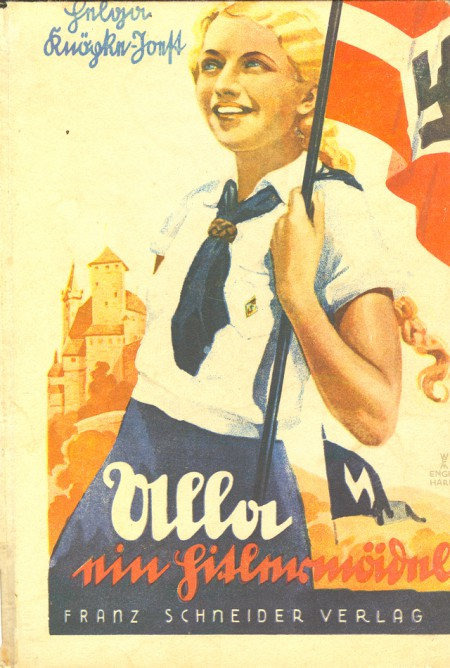
Yale professor and expert in the history of fascism, Timothy Snyder, talks of the 1924 Nazi manual of propaganda that advised finding simple slogans and repeating them over and over and framing opposition as disloyalty or worse. Many people, he says, have taken up these tactics in recent years, leading not only to an erosion of the understanding that politics should be about reasoned debate leading towards constructive and informed policy, but also to politics being viewed as a battleground between ‘friends’ and ‘enemies’.
You would need to be blind to not recognise that these tactics have become increasingly common in the UK and US in recent years, and how they have been used to manipulate the public into support for policies that are not in their best interests and that might have catastrophic consequences. Depending on the arena, dissent is framed as hatred, ‘anti-science,’ or not ‘evidence-based,’ and this acts as a powerful silencing force that shuts down critical thinking and coerces acceptance of what is often little more than hot air.
These tactics obscure who are the real beneficiaries of the propaganda – usually people who gain power or who benefit in financial or other ways from whatever is being promoted. Bizarrely, we can observe these practices on both the right and left of the political spectrum.
These tactics were on display in the University of Exeter Debating Society debate. It was by no means the first or only such debate I have taken part in or observed, and nor was it the first time that I saw those promoting the idea that ‘sex work is real work’ consciously or unconsciously using tactics from the Nazi propaganda playbook.
You don’t have to take my word for it. You can read the transcript of the debate and I’ll illustrate my claims through an analysis of the key arguments used by the two speakers for the proposition.
Jerry Barnett

The first speaker for the proposition was Jerry Barnett, who’s the author of the book, Porn Panic. He regularly writes on sex and the ‘economics of sex,’ and runs a YouTube channel called ‘Sex and Censorship.’ In other words, the sex industry indirectly provides his daily bread and butter.
After introducing himself, he defined work as: “A voluntary exchange of time or labour for money or some other payment.” He didn’t mention that this definition deviates significantly from the Oxford English Dictionary’s definition, which is based on mental or physical activity, and he didn’t explain how you can exchange time for money.
One of the key arguments against prostitution being considered normal work is that although it involves some mental and physical activity (pretending the punter’s a great guy, cleaning up afterwards, etc.) the core feature of prostitution is that he uses her body – he gropes and penetrates her. This is not about her being actively engaged in mental or physical activity but someone doing something to her.
What other work involves someone doing something to you while you lie back and endure it? The only thing that I can think of is participating in medical trials – but that’s not considered work – even though you might be paid for taking part.
So, he sneakily expanded the definition to make it easier to argue that a man penetrating your orifices is a normal form of work – although of course he didn’t mention penetration because, like most sex trade lobbyists, he buries such fundamental realities in euphemism and obfuscation.
Interestingly, he did admit that it is invariably men who are the customers (or punters as we call them) and nine or more times out of ten it is women who are being penetrated – or earning an income from ‘sex work’ as he euphemistically described it.
His arguments hinged around two key contentions: First, that ‘sex work’ is well-paid, enjoyable work that has short hours and is particularly suitable for anyone who needs flexibility. I will leave aside the questionable ethics of promoting such a skewed reality to an audience of impressionable young women and men.
Second, that opposition to ‘sex work’ is based on false statistics, the conflation of trafficking and consensual ‘sex work,’ and moralistic values from people who are anti-sex and who attack women’s rights, and refuse to “listen to sex workers who say it’s empowering.”
Most of the time, he expounded on one or other of these claims, all presented with utter conviction, while implicitly framing anyone who disagreed with him as the enemy – the enemy of women’s rights, of rational debate, of men, of more or less everything that he considers good in life.
He dismissed my arguments as “anecdotes” even though most of his were based on wishful thinking rather than hard evidence – while at the same time claiming they were “evidence-based.”
For example, I mentioned that the murder rate of women involved in prostitution is the highest of any group, including in the UK, and that where prostitution is legalised, the murder rate of women in prostitution usually remains high.
His immediate response?
“Anna is good with anecdotes but when she tries to use statistics, they don’t seem to add up at all. I think the last time I looked, the professions with the highest [murder rate] were police and fast-food delivery people who are overwhelmingly men. But yeah, the anecdotes stack up, the statistics don’t.”
I didn’t manage to respond to this until much later in the debate, when I quoted a senior police officer who, when giving evidence at a Home Affairs Select Committee inquiry in early 2016, said:
“We have had 153 murders of prostitutes since 1990, which is probably the highest group of murders in any one category, so that gives the police cause for concern.”
I didn’t have the stats for police murders at my fingertips but I looked them up later and found data that suggested there had been about 28 murders of police officers in the UK during the same period (1990-2015). So, there were more than five times as many murders of women involved in prostitution as police officers. I couldn’t find any data on fast food delivery drivers other than a few isolated press reports.
So much for his grasp on statistics. But the damage had been done.
Charlotte Rose, the other speaker for the proposition, compounded the damage by asserting more than once that there had been no murders recorded of women involved in prostitution in New Zealand, where the sex industry is fully decriminalised.
But again, this is untrue. The German women who run the Sex Industry Kills project have documented 10 murders of prostituted women in New Zealand since the sex trade was decriminalised in 2003 along with a number of attempted murders. That is a significant number given New Zealand’s small population (currently less than 5 million).
One of my key arguments was that the sex industry normalises and eroticises male dominance and one-sided sex, and feeds men’s entitlement and reduces their empathy – which are the very attitudes that underpin the current epidemic of rape, child sexual abuse, and other forms of male violence against women and children.
Jerry’s response? That there was not an epidemic of male violence against women. He based this assertion on another made-up definition centred on “a steep sustained increase” – unlike the Oxford Dictionary, which centres the definition merely on a disease being widespread.
He said that not only was there not an epidemic of male violence but that the prevalence of such violence has been on a steep decline for 50 years.
But this is not true. Research has shown that male violence against women has risen significantly in the UK since 2010 and that new forms of gender-based abuse are increasingly prevalent. Even the UN describes male violence against women as a pandemic – which is an epidemic that has spread to cover multiple countries.
I mentioned that the judge in a judicial review about Sheffield Council’s relicensing of Spearmint Rhino (a lap dancing club) had castigated the council for rejecting a large number of objections from women and community members who said that the club had made the streets less safe on the basis that these objections were nothing more than “moral values.” The judge was clear that the objections were not about morality but were issues of equality.
Jerry responded as follows:
“There was briefly the anecdote about Spearmint Rhino and that women didn’t feel safe in the area. The fact is I’ve been involved, I’ve got stripper friends who’ve been involved in these campaigns to keep the venues open and these claims are false. They come up over and over again – that the presence of a strip club in an area makes women less safe. This has been de-proved, debunked, using evidence over and over and over again. So, the idea that women don’t feel safe in the area is a different thing.
Unfortunately, if women don’t feel safe, that’s sad but then they should acquaint themselves with the facts that actually the presence of a strip club in an area does not lead to an increase in sexual violence. And yet these kinds of things are continuously claimed to make it look like this is a woman’s rights movement rather than a morality movement, which it is.”
As for his claim that the increased violence in the vicinity of lap dancing clubs and similar has been “debunked” many times, well I couldn’t find any clear evidence that supported that. Rather I found much to the contrary. The Women and Equalities Select Parliamentary Committee in its report on its inquiry into Sexual Harassment of Women and Girls in Public Places, accepted the considerable evidence that sexual entertainment venues, such as lap dancing clubs, “promote the idea that sexual objectification of women and sexual harassment commonly in those environments is lawful and acceptable.”
But that is not good enough for Jerry. He sticks to what he knows is effective, and repeats sound bites that are simply not true while dismissing solid evidence and presenting any opposition as irrational and the work of moralistic enemies.
As to a man telling women they are being irrational to fear male violence, what can I say? I am not sure anything I would like to say is publishable.
Charlotte Rose

The second speaker for the proposition was Charlotte Rose, who was wearing a t-shirt advertising Fan Baits, a new commercial sex industry advertising platform. She introduced herself as, “a former multi-award-winning escort, current radio presenter and advocate for decriminalisation of sex work.”
She went on to say:
“I just want to discuss something that may affect your moral judgement. How do you all feel when I mention people who work in abortion clinics, abattoirs, factory farmers, nuclear power station workers? To name just a few. For me I do not like it. But just because we do not like what these people do, it doesn’t give us the right to state that their work is not legitimate.”
Since when have people campaigned against factory farming or nuclear power because they didn’t approve of the people who work in those industries? Eccentrics aside, the arguments are always around the impact of those industries on the environment, human and animal health and welfare, and other wider issues – and any personal disapproval is reserved for those who, knowing the damage caused, profit from those industries.
The inclusion of abortion clinics in this list is a sneaky attempt to associate our opposition to the commercial sex industry with extreme anti-woman protestors against abortion. This is a classic example of suggesting guilt by association. For an audience of students whose average age is likely to coincide with the peak age for abortions, this is particularly reprehensible.
Charlotte then said that “until you’ve worked as a sex worker, you’ve got no right whatsoever to dictate anything against [sex work].” This is an argument that we hear repeated over and over in true propaganda playbook style, making people lose their critical faculties and the ability to say, hang on a minute, I’m entitled to have an opinion on factory farming and nuclear power and other industries that have a wide impact, why on earth can’t I have an opinion on the sex industry?
And the truth is, of course you can have such an opinion, and indeed as a concerned citizen, you should – but they don’t want you to. Because once you really look at the sex industry, it’s hard to ignore the rampant abuses and negative impacts on us all, particularly young people.
Like Jerry, Charlotte expounded on how “consensual sex work” has nothing to do with sexual abuse, exploitation and trafficking. But of course, it does. There is no separate market for trafficked women – they are on the same street corners and in the same brothels and so-called massage parlours as women who may have made some kind of choice to be there. From the outside you can’t tell what led a woman to that place – nor what is holding her there.
As we have written elsewhere, most pimping meets the international definition of human trafficking and most women involved in prostitution have one or more third party (i.e. pimp) feeding off their prostitution. And the evidence of the violence inherent in prostitution is overwhelming.
Charlotte may not be a male chauvinist pig as all the evidence suggests that Jerry is, but she was equally happy to misrepresent our arguments and frame us as hateful and dangerous. She claimed several times that we want to “delegitimise” her work. (What work? Didn’t she say she was a former sex worker?)
In an attempt to convince everyone that her work really is real work, she went into a long explanation of what it entails: dealing with emails (80 a day), text messages (120/day), phone calls (50), notifications, advertising, website SEO, updating her photos, social media and special offers, booking hotels, etc.
She then asked whether that sounded like work – which of course it does. But that was missing the whole point of the debate because she didn’t mention the core aspects of prostitution – sexual intimacy with a stranger who pays you to have his every whim and fetish met with a smile.
She claimed that “delegitimising sex work” damages her credibility and means men won’t see it as legitimate work and means she “can’t get a mortgage by writing down that I’m a sex worker.” But later when she was asked why she was against legalisation of the sex trade (she favours full decriminalisation), she said:
“Legalisation is what happens in Amsterdam, but women, or sex workers […] have to pay for a licence. So, first of all, they’ve got to give a large amount of money to be able to get a licence to give them the ability to work and be in a legitimate premise.
Number one, they cost a lot of money. Number two, their details are known so there’s no anonymity. If someone wants their business not to be known to the government, then unfortunately they won’t be able to work. So, these two massive factors are why we don’t want it to be legalised.”
But hang on a minute… Isn’t she arguing for ‘sex work’ to be considered ‘real work’?
And isn’t one of the things that distinguishes ‘real’ – or legitimate – work from scams, drug dealing and other illegal activity, that when you earn money from ‘real work,’ you fill out a tax return and inform the government about where your income comes from.
So actually it sounds like she doesn’t want it to be regular ‘real work’ after all.
She made other arguments that were equally dodgy. She claimed several times that by expressing our views, we are causing actual harm to sex workers:
“One of my morals is not to cause harm to other people. I would never use my morals to cause harm to anybody. Your moralistic view is causing harm to sex workers.”
She is talking about an industry in which women involved in it have an extremely high murder rate – almost invariably by male punters and pimps – and yet she suggests that the problem is naming and describing this reality.
I explained that our position is that nothing can make prostitution safe and so we need to reduce the amount that happens. Anything that normalizes it means it will increase – it will increase men’s demand for it and more women will be sucked in and be hurt. As her position is that prostitution should be legitimised and become a normal job, you could therefore argue that her position will cause harm – like she claims about us. However, we prefer to argue on the facts and actual evidence.
Conclusion
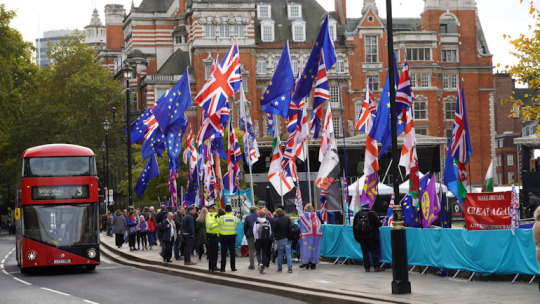
Judging by the comments on social media, the young audience were swept along by Charlotte’s glamorous and suave act – in the face of which our attempts to focus the debate on the depressing realities of prostitution appeared about as alluring as a school assembly address by Miss Trunchbull on a bad day.
But reality is what we must deal with. Basing public policy on wishful thinking and propaganda invented by those with powerful vested interests is a recipe for disaster. You only need to consider Brexit to understand that.
The Brexit debate was dominated by sound bites and hot air underwritten by hedge fundies and other capitalists salivating at the prospect of looser and weaker regulation of business and commerce. But large sections of the British population were swept along by the propaganda and were blind to the likely dangers. It is only now, four years later, as the actual reality of Brexit is becoming impossible to ignore that opinion polls are showing the majority turning against it and realising it is almost certainly a terrible mistake.
You can’t help wondering in this context why schools and universities are not educating students about the dangers of propaganda and how to recognise and resist it. All of us, but especially young people, need to understand how to identify vested interests, easy answers and soundbites that oversimplify complex subjects, attacks on opponents and unevidenced assertions that they are motivated by hate or worse, and to see these as red flags.
Much of life is complex and messy and inequality and abuse of power is rife. There are no easy answers. Real solutions require hard work and challenging powerful vested interests – not following them like sheep.
10 notes
·
View notes